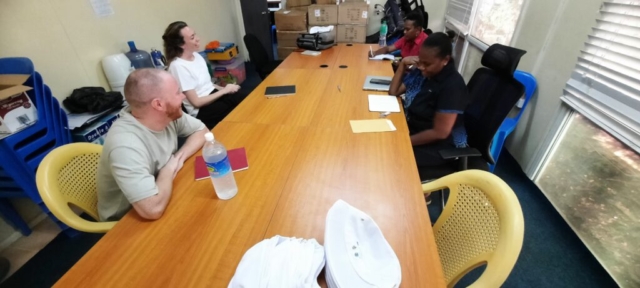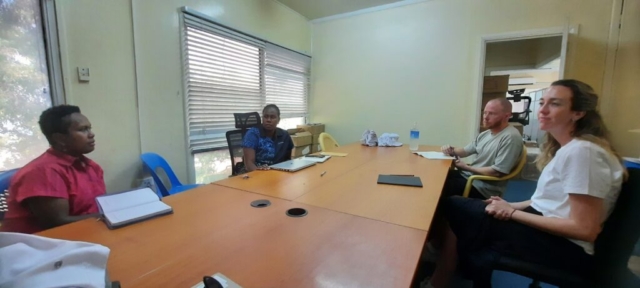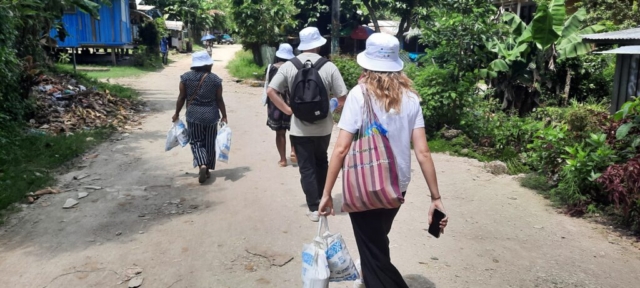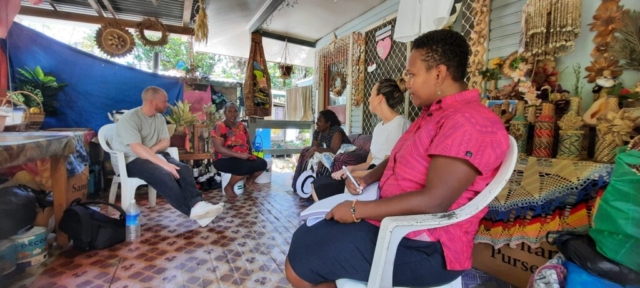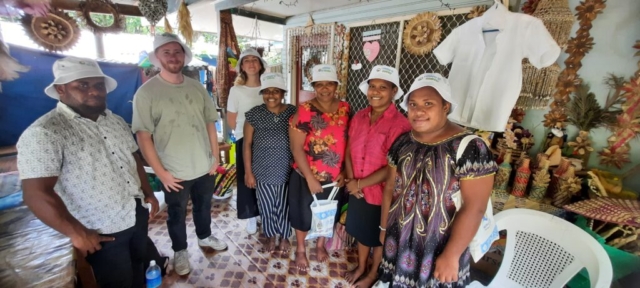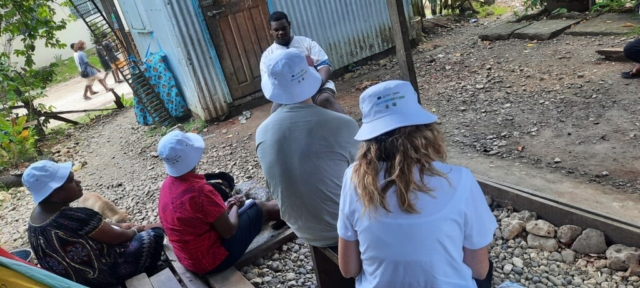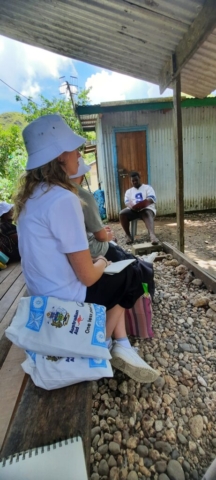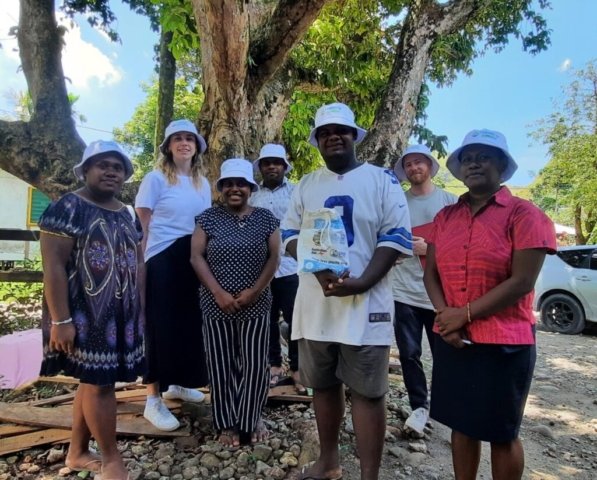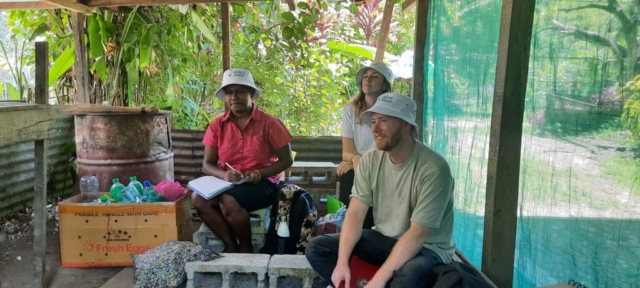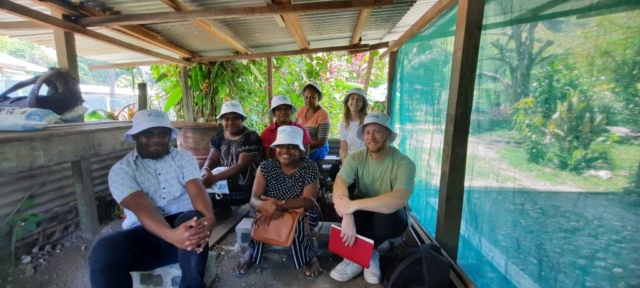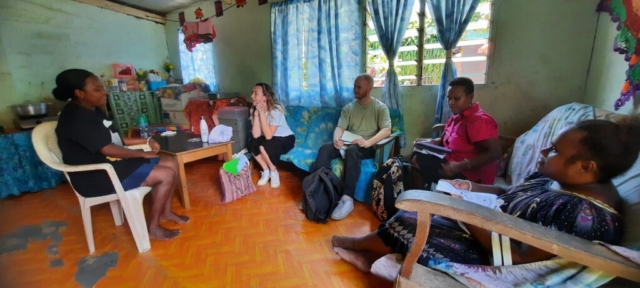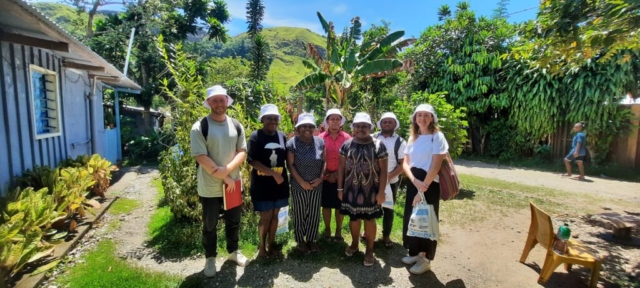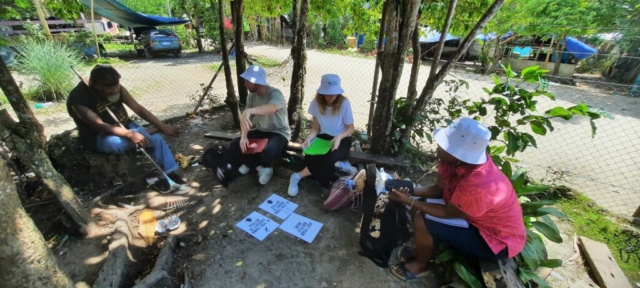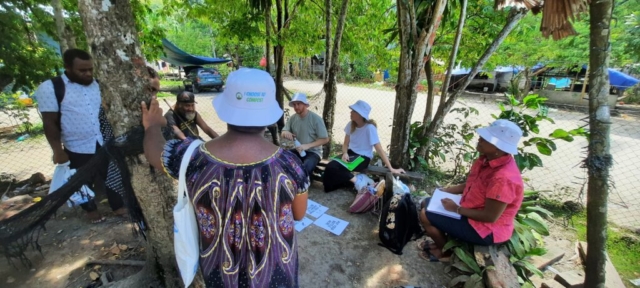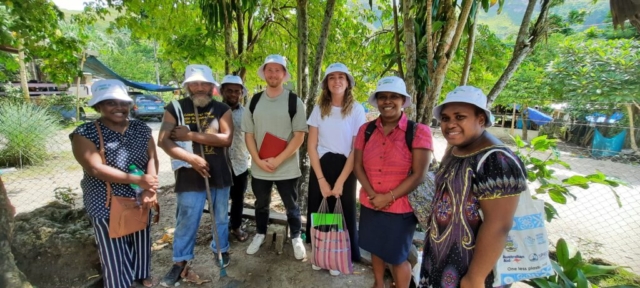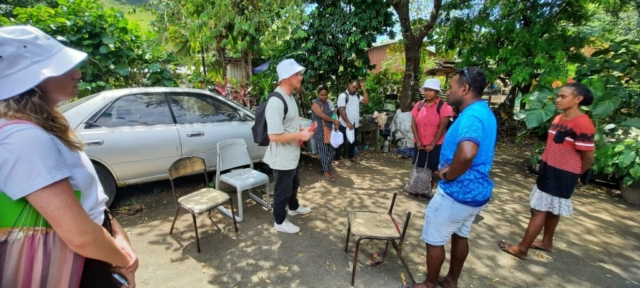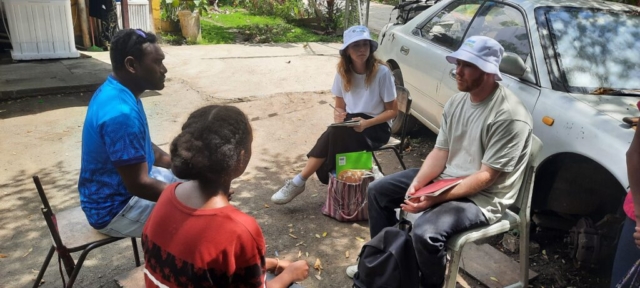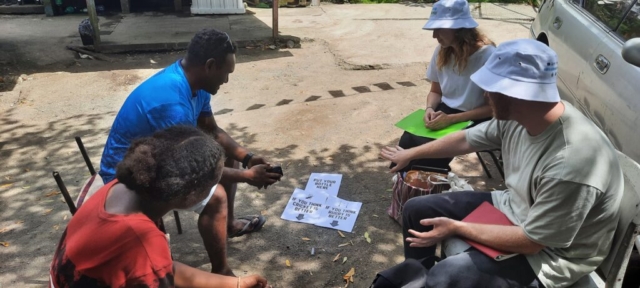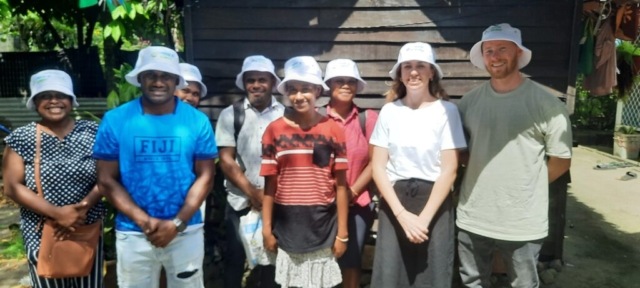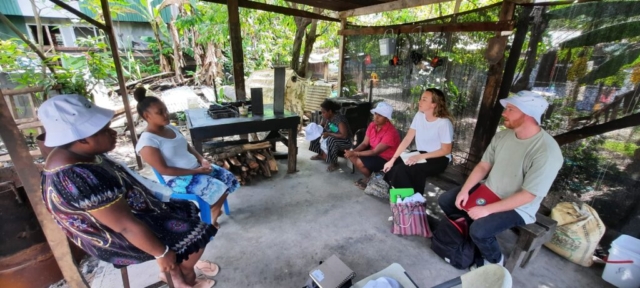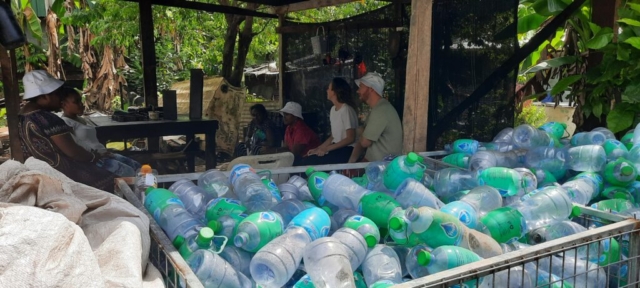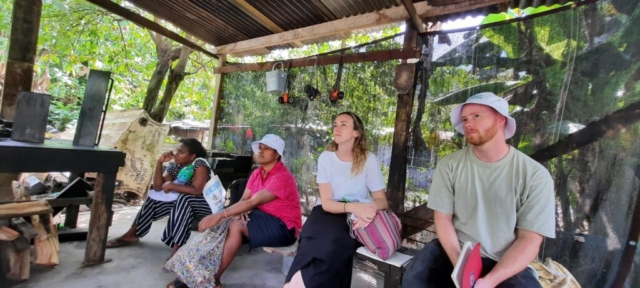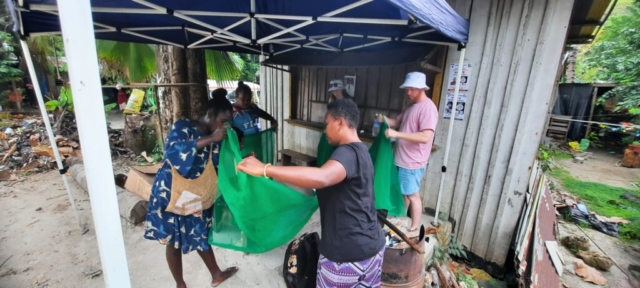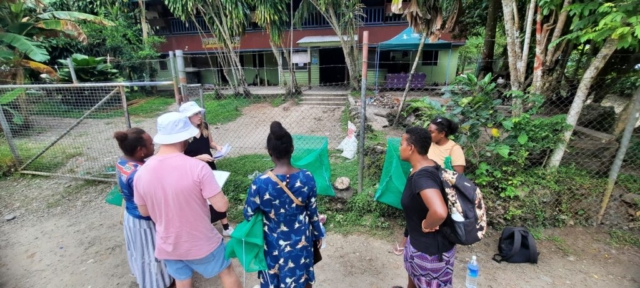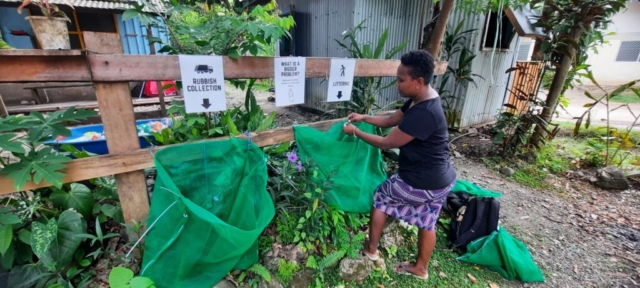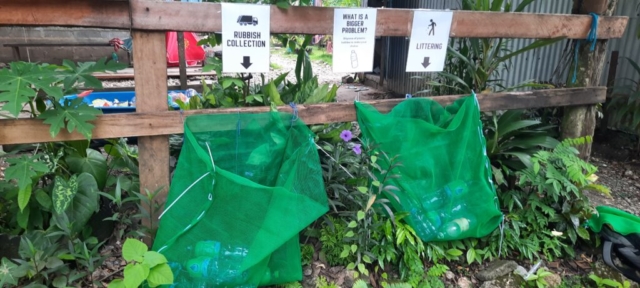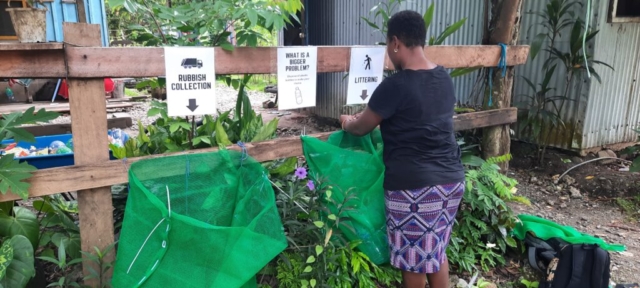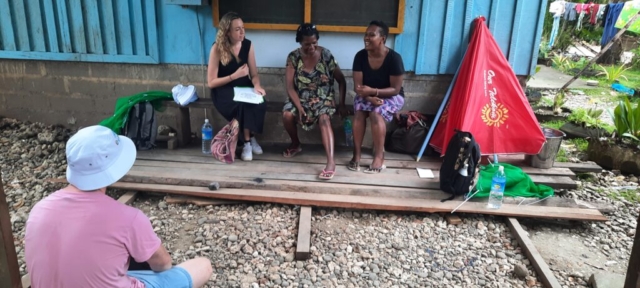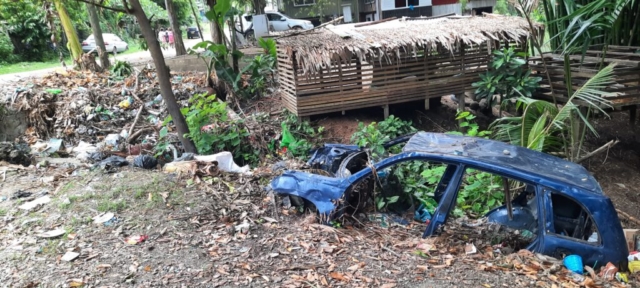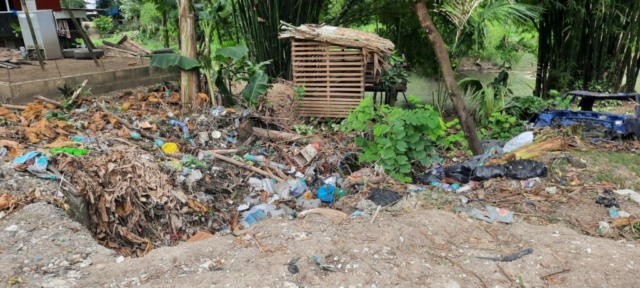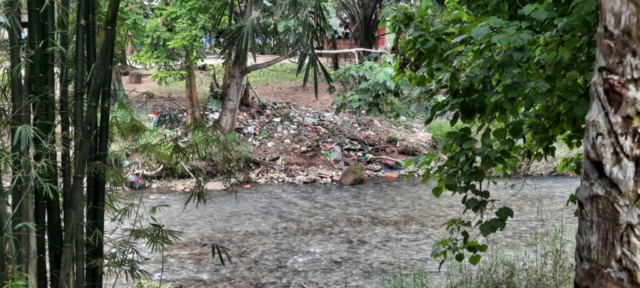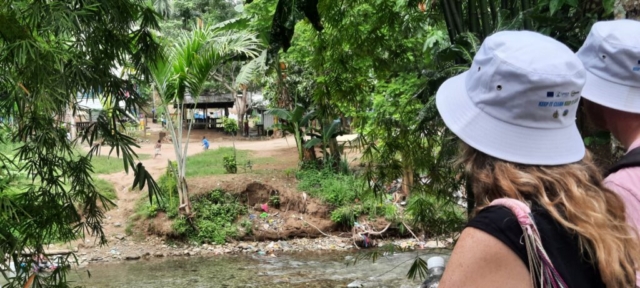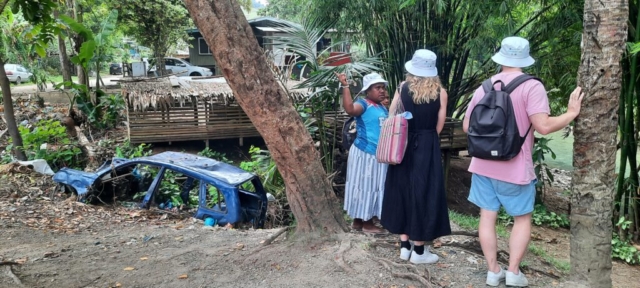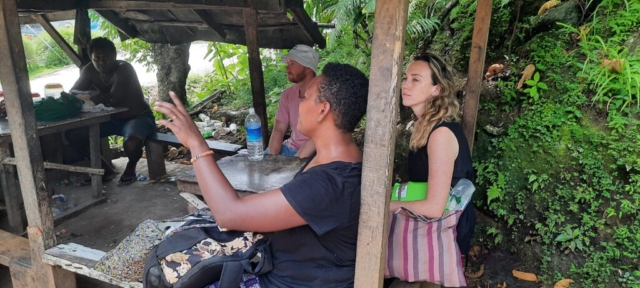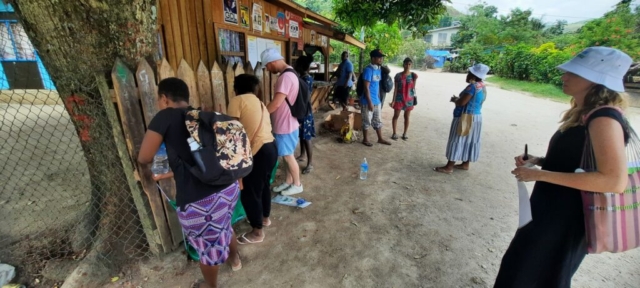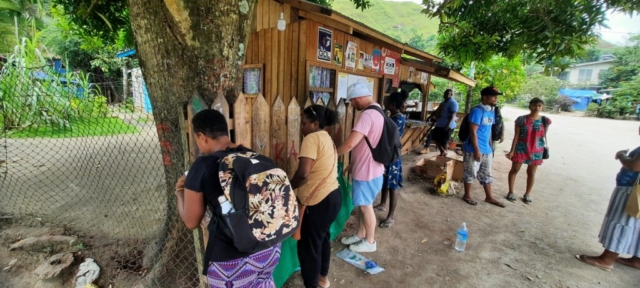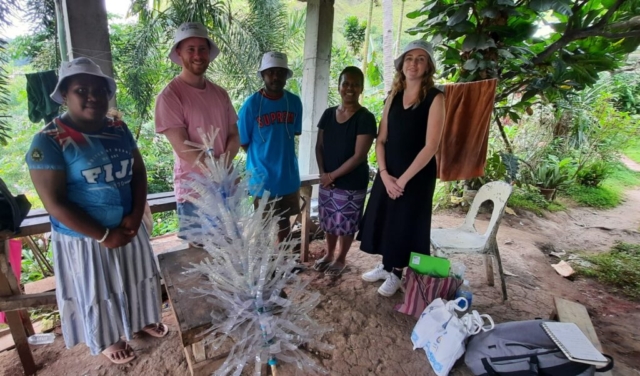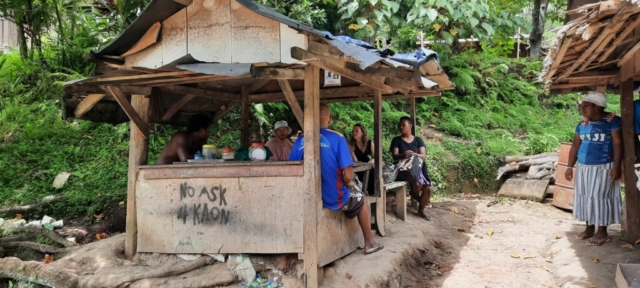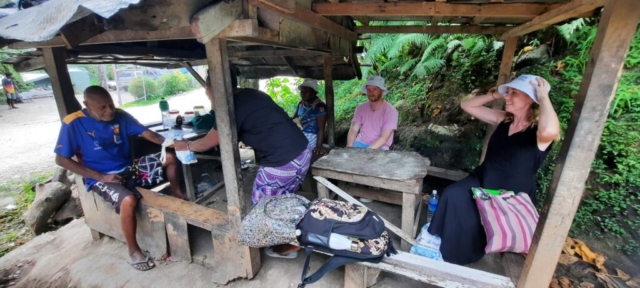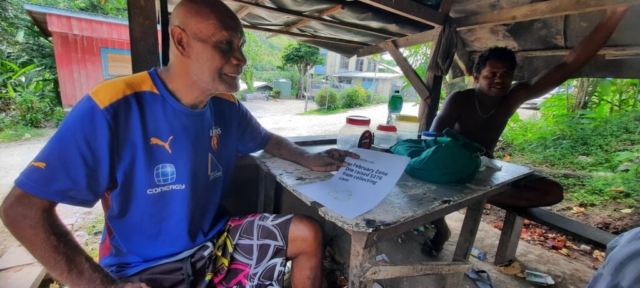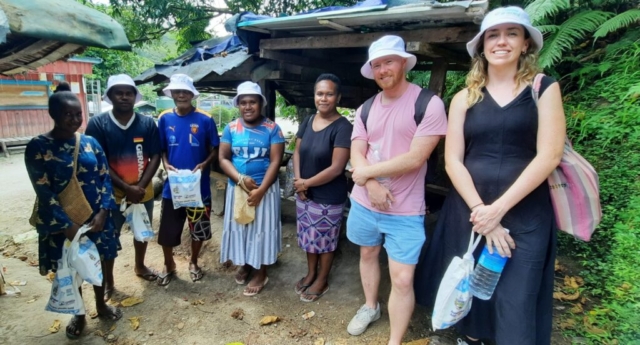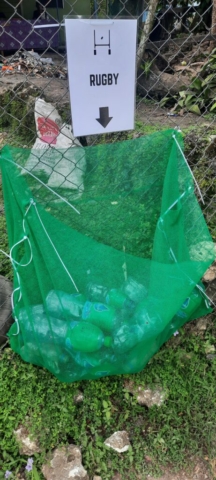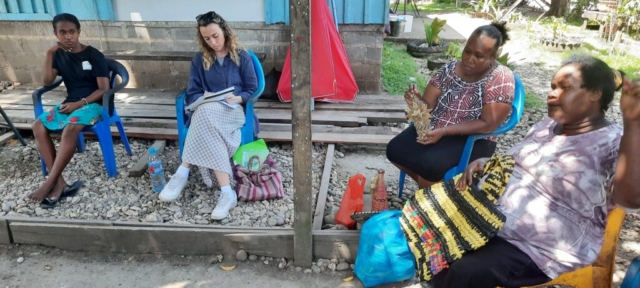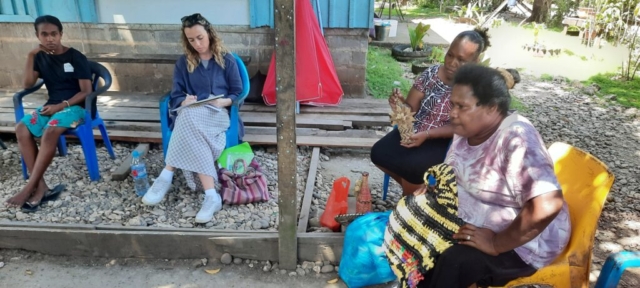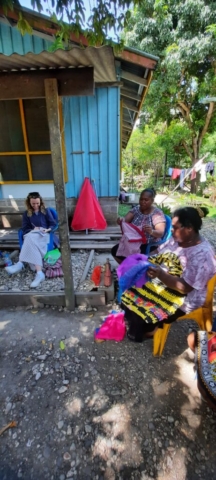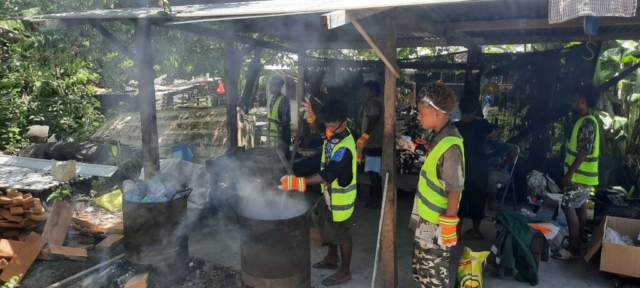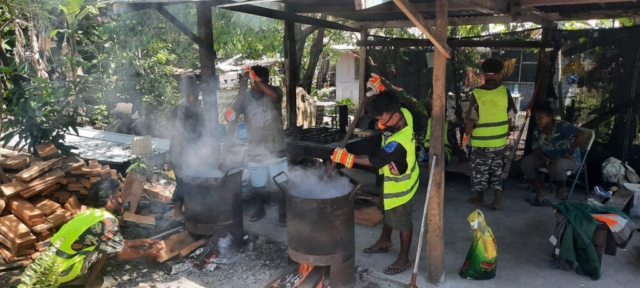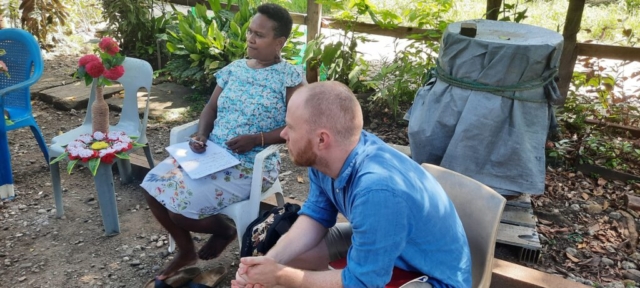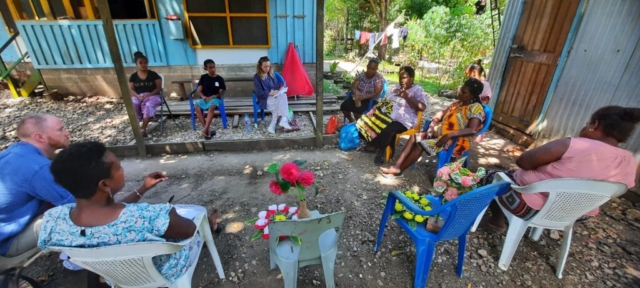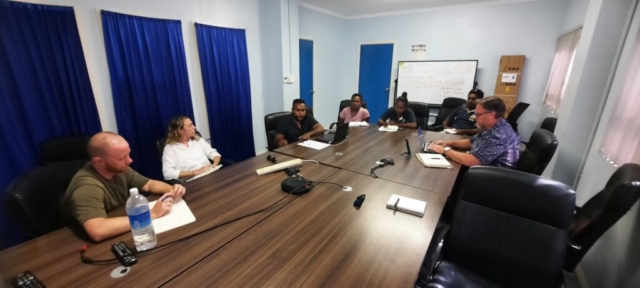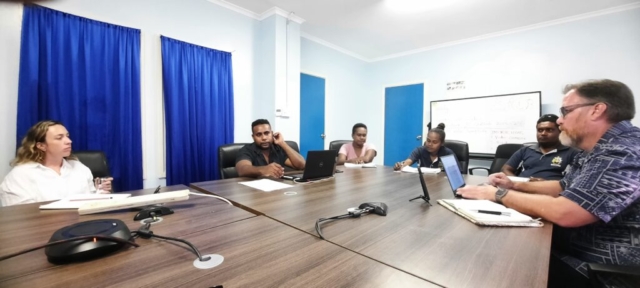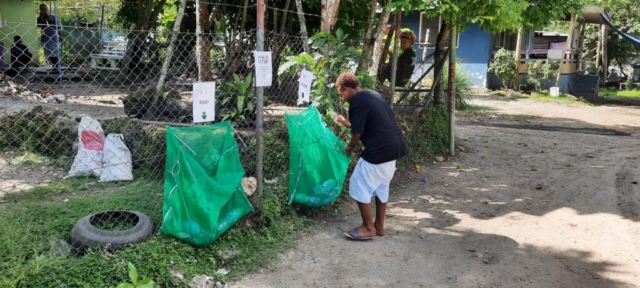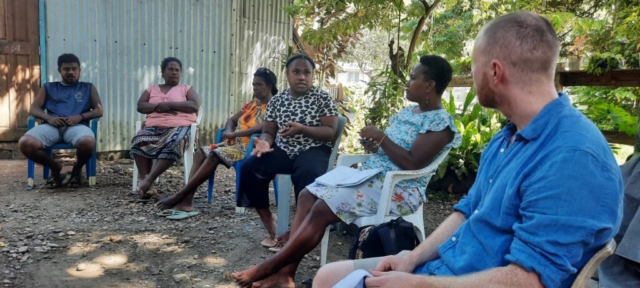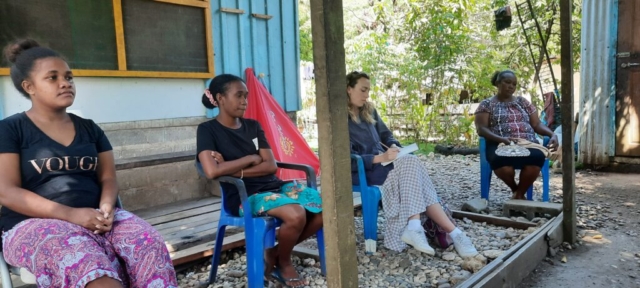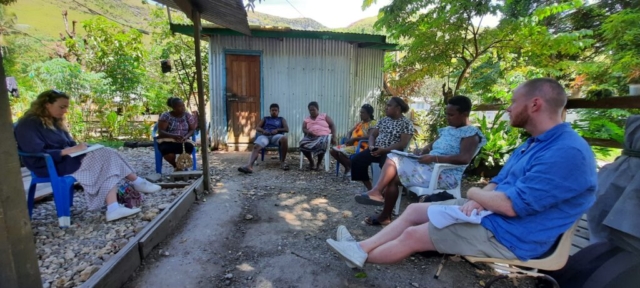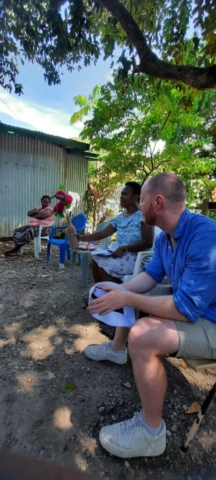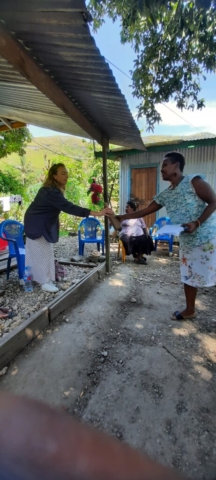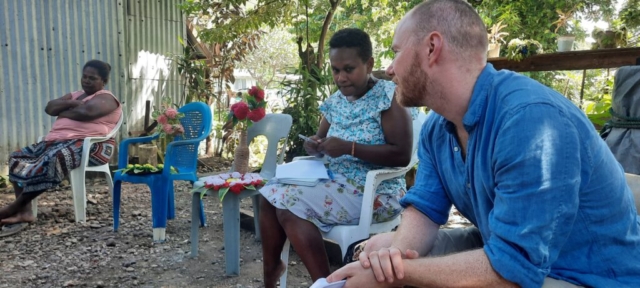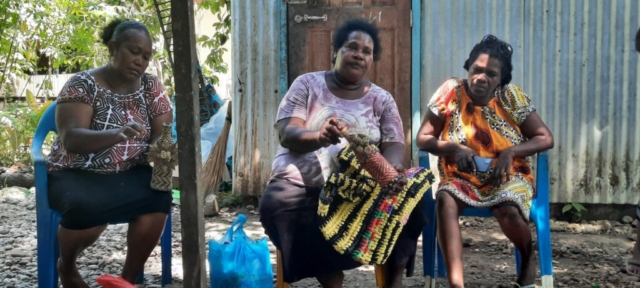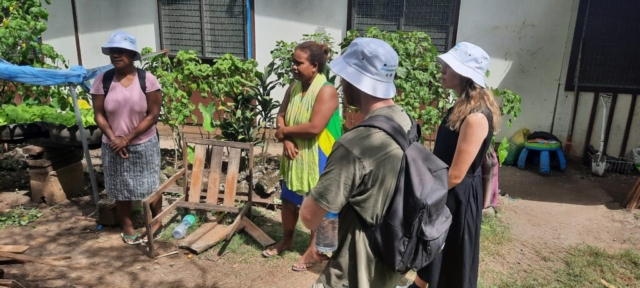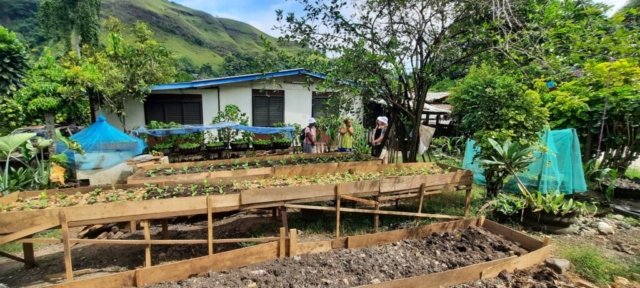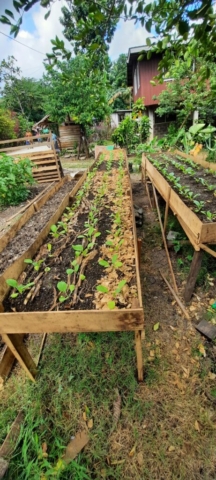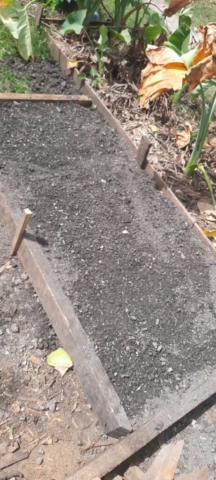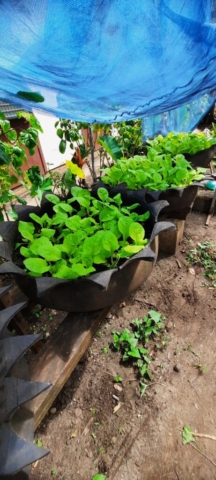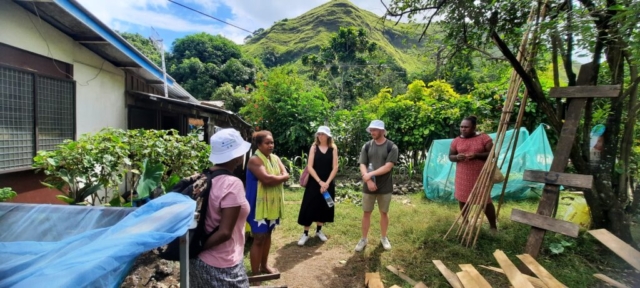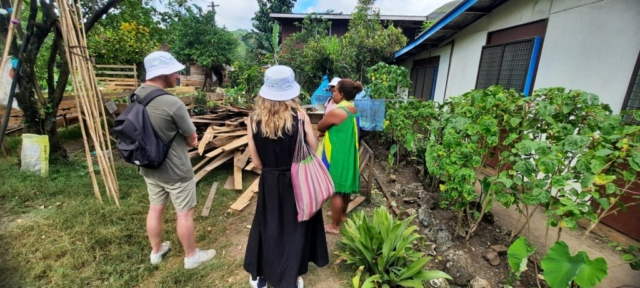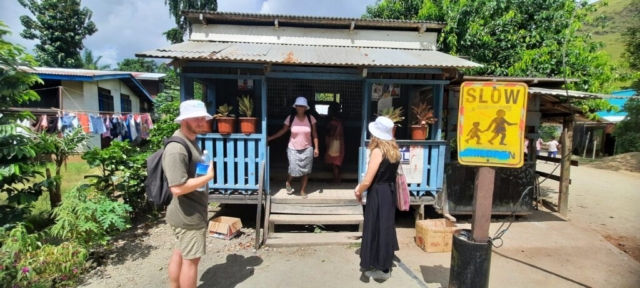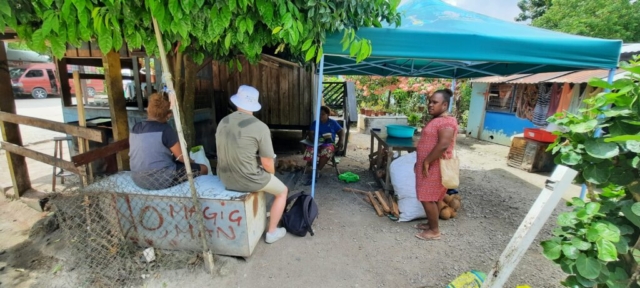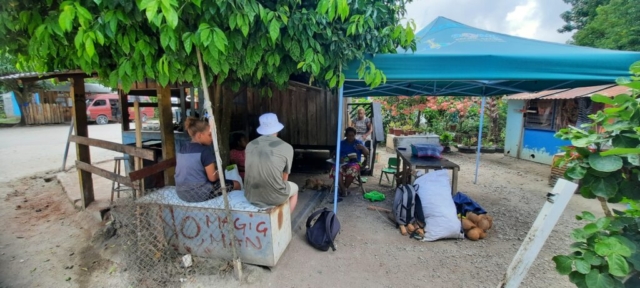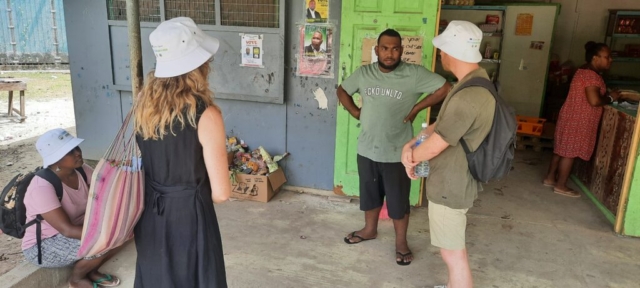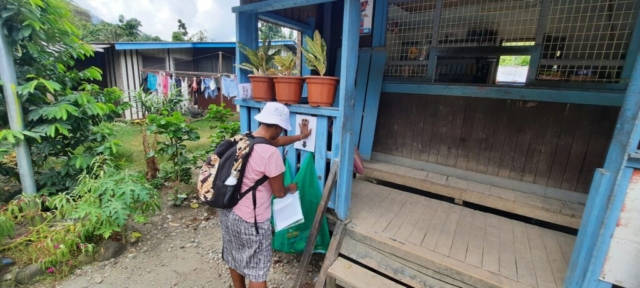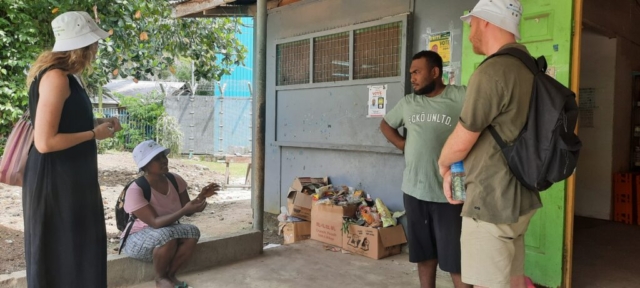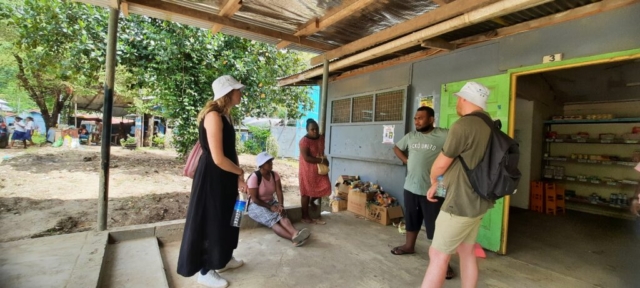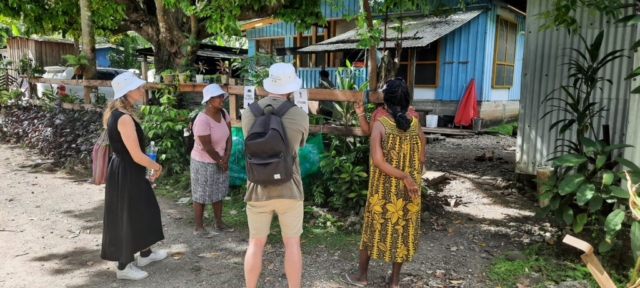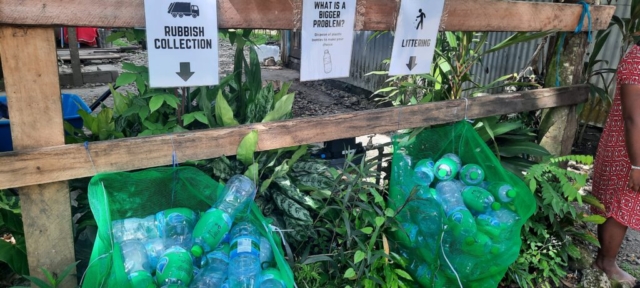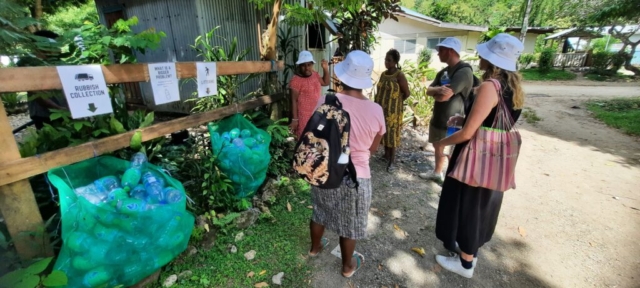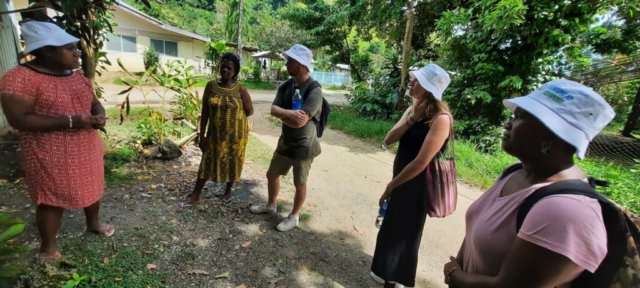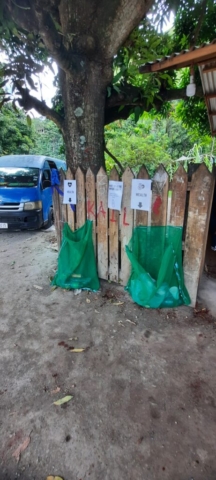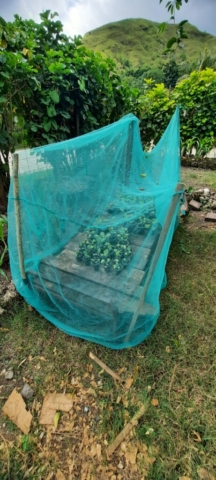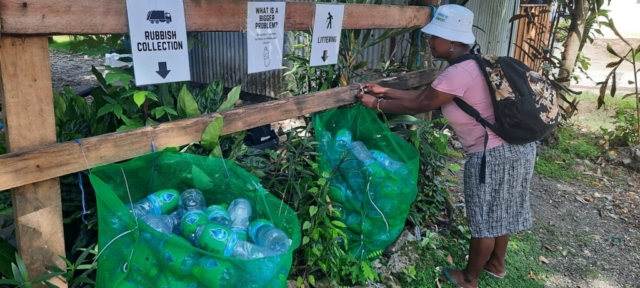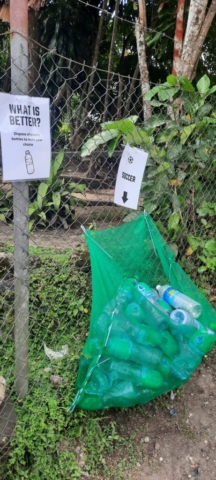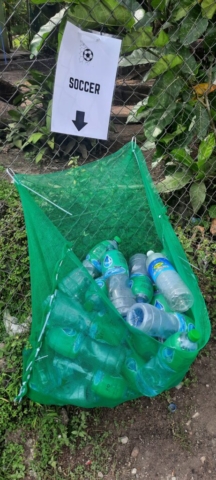Managing organic material is a lot more efficient for the Majuro Atoll Waste Company (MAWC) in the Republic of Marshall Islands, with the arrival of a new heavy-duty chipper.
The new bright orange mobile chipper is currently in operating at the dumpsite, processing the organic material received into mulch for transport to the compost facility. Once this commissioning phase is over and the team familiar with the equipment, the chipper will be towed around the communities collecting and processing organic material at source.
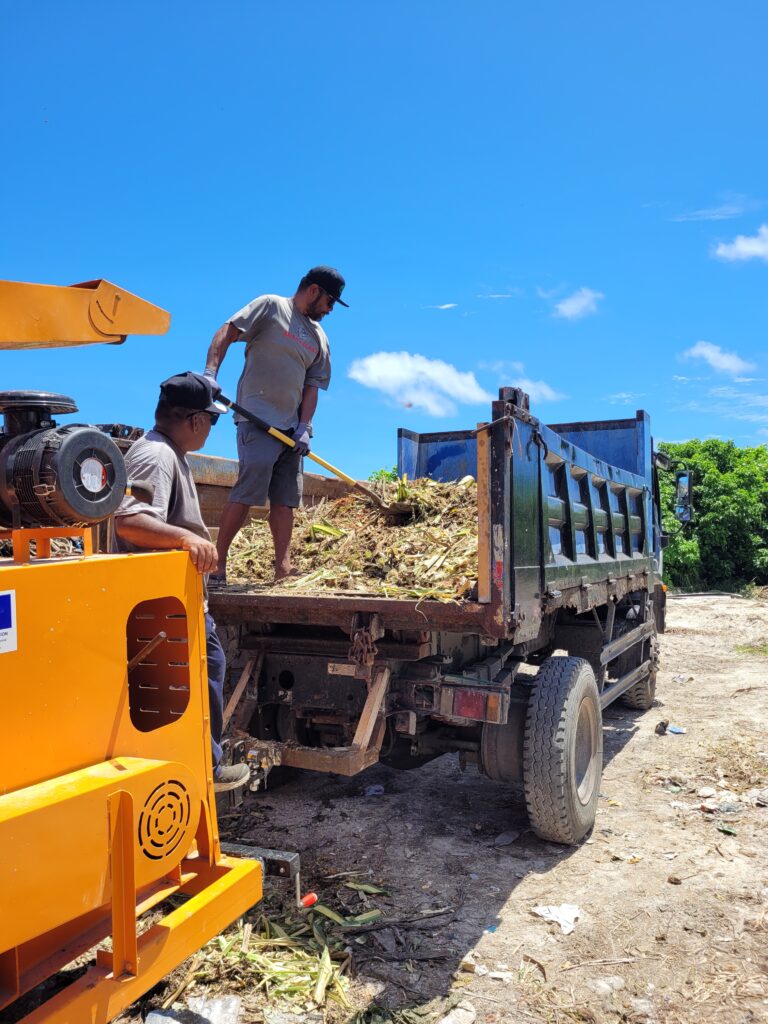
The chipper was carefully chosen to process the high fibrous vegetation such as coconut fronds and pandanus common in Majuro. MAWC, in partnership with the EU-funded and SPREP-implemented PacWastePlus programme, undertook significant research prior to selecting the chosen chipper.
“Our existing chippers operate using blades,” said MAWC Operations Manager, Ms Jacqueline Lakmis. “We found we could only operate them for a limited time before they were jammed or overheated. This new chipper operated with a large drum, it sure makes short work of processing our tough this woody vegetation. We recommend this equipment to other Pacific nations.”
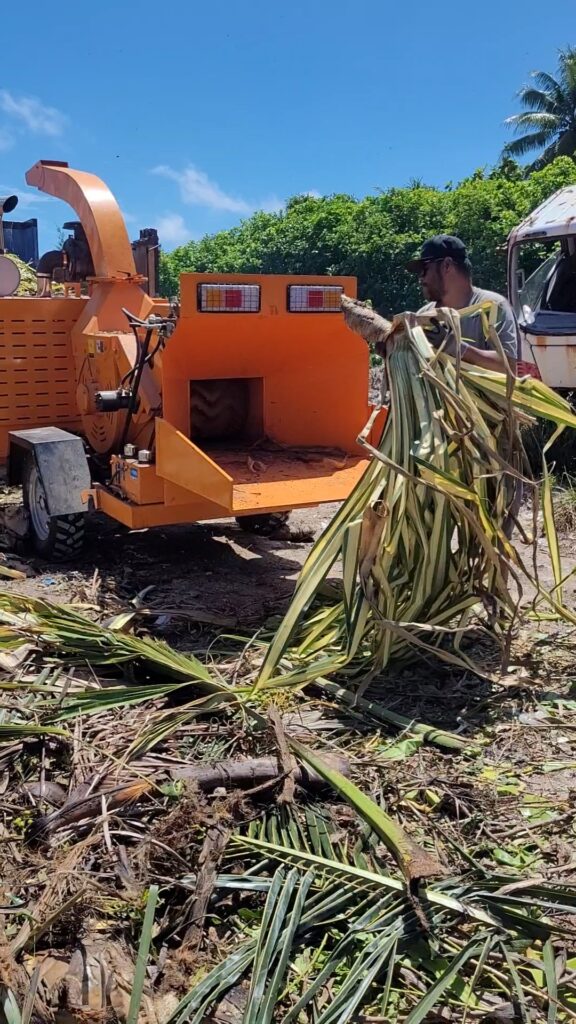
PacWastePlus Technical Officer, Ms Hilary Boyes joined the MAWC team for a morning during the processing of the organic material.
“The drum-chipper really preforms well. In about 2.15hr, we processed approximately 15m3 of tough organic materials such as whole pandanus plants, large dry coconut fronts, some tree trunks up to about 12 inches, even a couple of whole coconuts got into the input feed. The chipper processed them all with no hesitation. It was very satisfying!”
“The research suggests that ‘drum style’ chippers are better for processing this woody vegetation compared to blade, disc, or flywheel style chippers,” continued Ms Boyes “I am pleased we spent the time to get the right chipper for the MAWC team.”

The chipper underwent manufacture modifications to ensure it was fit for purpose for Majuro – with a larger engine to manage the expected volume of material and a swivel output feed so the team can choose whether the mulched material is blown straight onto the dump truck or sideways onto people yard.
The 15m3 was converted into about 5m3 of mulch. PacWastePlus will shortly publish a case study of the specs of the chipper and its performance processing the material in Majuro to assist other pacific countries to make an informed decision on the chipper appropriate for their vegetation.
Before selecting equipment, PacWastePlus recommends buyers to read operating manuals carefully and speak to suppliers and experts. If the manual only refers to wood as a suitable input or the manufacturer cannot supply evidence of the equipment managing high fibrous vegetation, further research may be required.
The Tuvalu Department of Waste Management (DWM) is determined to keep their communities safe from the potential hazard of asbestos though accurate data collection and assessment.
Director of DWM, Mr Epu Falega, knows the consequences of not addressing the issue and is working to do everything possible to safeguard his country and people.
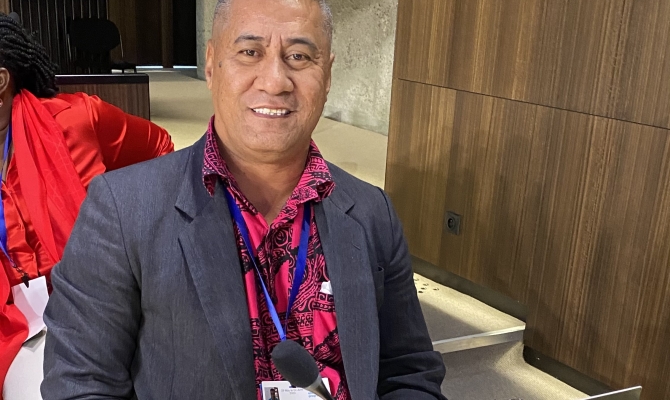
“By learning the location and quantity of asbestos in the Outer Islands means we can manage the interaction with the asbestos, employ safe practices if there is any disaster situation, and make a plan for its eventual removal and remediation,” he said. “By knowing where the asbestos is we can help our communities live with it safely.”
The DWM Waste Education & Awareness Officer, Mr Siliako Letueti Alofi, who is also the Acting Operation, & Waste Auditor, has just returned from the Tuvalu island of Niu where he completed the first successful survey of all buildings to understand location of asbestos.
The assessment was undertaken using new technology, the microPHAZIR, supplied to the DWM by the EU-funded and SPREP-implemented, PacWastePlus programme. The microPHAZIR is a handheld analyser tool that enables safe, non-invasive, in-field rapid screening and identification of all six types of regulated asbestos fibres.

Mr Letueti was provided training on the use of the tool and asbestos identification and was supported remotely by experts at Hibbs Hazardous Material consultancy and PacWastePlus. “I identified and sampled all cement material on the island of Niu to confirm whether it contained asbestos or not,” he said.
“The survey covered all 148 buildings on the island, with 17 samples not able to be obtained as the material was too high up. Out of the 131 samples, 19 tests contained asbestos, including the 2 roofs of the old chapel which have been in Nui since 1925.”
Mr Letueti recorded the location and extant of asbestos found so a plan can be made for its long term management and remediation.

He also completed an awareness programme with 60 representatives from the community, including 20 men, 20 women and 20 youth, to educate the community on how to live safely with asbestos in Nui.
“The main message is that in Tuvalu the asbestos product we have is cement sheeting. This material does not pose a risk if it remains undamaged,” he said.
“If it gets damaged and fibres are exposed though cutting or sawing or grinding or by blowing over in high winds, and the fibres are breathed in, they can cause diseases such as lung cancer. The best thing for us to do in our community is to leave asbestos alone.
“Don’t disturb or cause dust. Don’t drill, saw, or grind.”
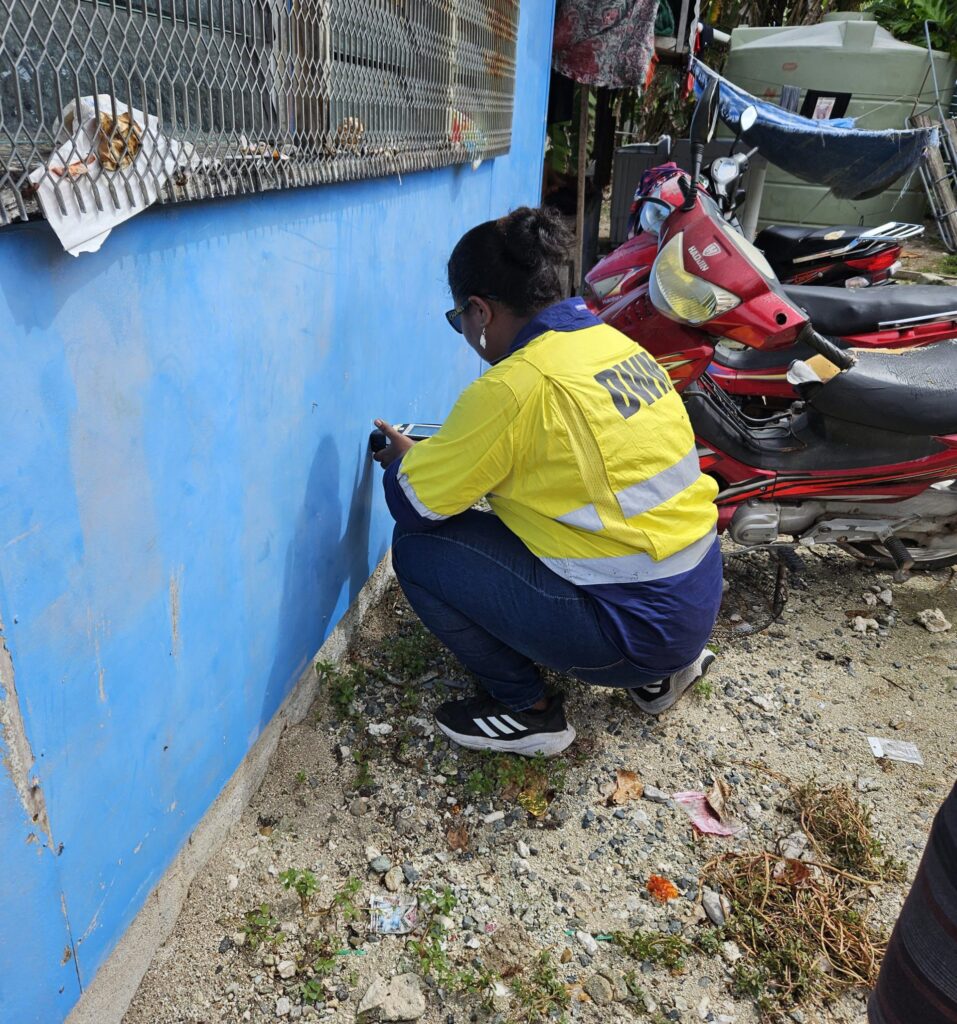
Vanuatu’s Department of Environment Protection and Conservation (DEPC) is serious about improving waste management in the country.
Under the guidance of the Minister of Climate Change Adaptation, Meteorology and Geo-Hazards, Energy, Environment and Disaster Management, Hon. Minister Ralph Regenvanu, and in partnership with a Council of Minister approved multi-agency Working Group, the DEPC team is working closely with global experts to design a Product Stewardship Scheme (PSS) to manage beverage container waste in Vanuatu.
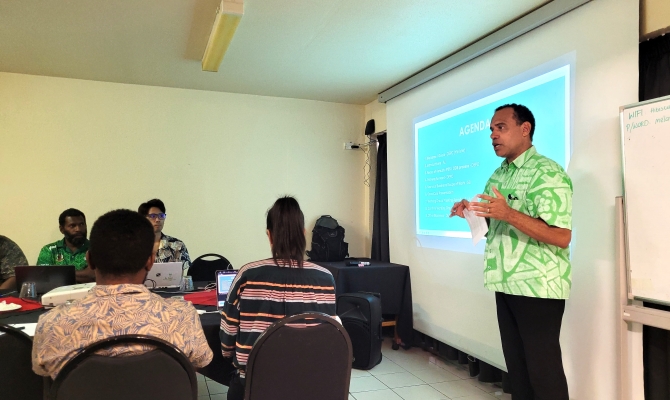
“We see a PSS scheme as an effective solution for waste management in Vanuatu. This is our year to get the scheme designed,” says Roselyn Bue, Senior Officer at the DEPC.
“With the Working Group and other donors such as J-PRISM II, we have been researching schemes 2017. The deposit element will incentivise our communities to recycle their beverage containers, and the fee elements will provide financing for the materials handling / export and scheme administration.
“A PSS scheme will assist Vanuatu to sustainable manage our beverage container waste for the long term and provide economic benefits for our communities.”
During the latest Working Group Meeting on 26 June, Minister Hon. Regenvanu reemphasised that the goals of the scheme include both environmental and social benefits for Vanuatu. It is designed to reduce litter and improve recycling, provide for equality and create new employment opportunities in all provinces across Vanuatu.
Dr. Christina Shaw, CEO of Vanuatu Environmental Science Society, and key member of the Working Group is keen to see the scheme progress.
“In other countries we hear that it is the Private Sector importers and manufacturers of beverage containers blocking schemes or slowing them down. Here in Vanuatu the biggest importers and manufacturers are real proponents for a scheme, they want the scheme to start, they see the benefit for Vanuatu,” she said.
Searious Business have been engaged though the EU-funded SPREP-implemented PacWastePlus programme to assist the DEPC and the Working Group to finalise the scheme design for Vanuatu.
The Searious Business bring expertise of PSS / deposit schemes from around the world and will undertake consultation with scheme stakeholders and complete financial modelling of scheme options for DEPC and the Working Group to make informed decisions.
Searious Business will then assist the DEPC with scheme legislative drafting elements, and developing the operating procedures and contract templates to allow a scheme to be “tuned on” when approved by the Vanuatu Government.
Poorly handled healthcare waste and poor waste management ethics is a major problem in Papua New Guinea (PNG).
Emissions from healthcare wastes due to poorly executed waste reduction and landfilling activities have led to adverse environmental impacts such as contamination and human exposure to infectious wastes. This results in elevated chance of disease and sickness for members of the community.
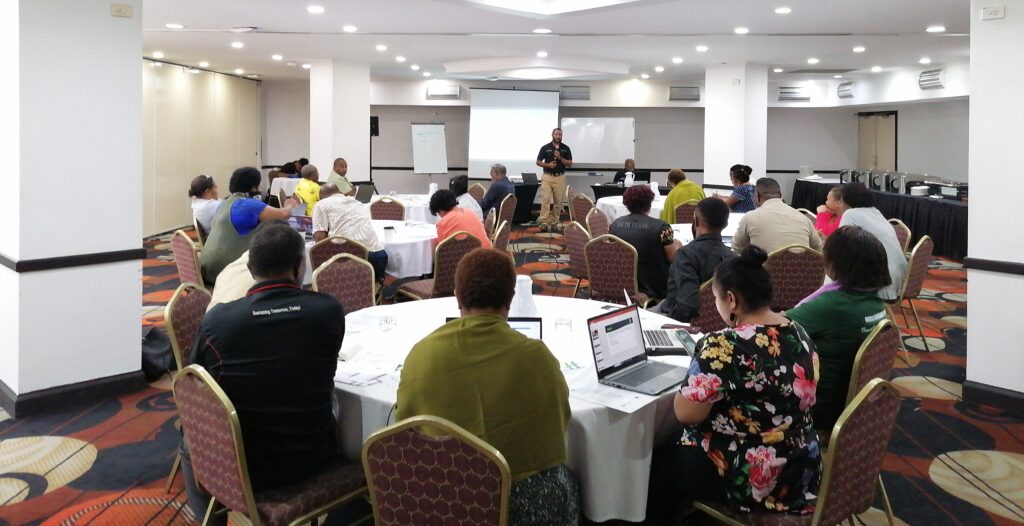
To address the issue, PacWastePlus and the PNG National Capital District Provincial Health Authority (NCDPHA) conducted a second pilot Healthcare Waste Management Training of Trainers workshop in Port Moresby on 27 May 2024.
Of 26 participants who attended the workshop, 16 were health care officers from ten selected Health Care centres in Port Moresby. They expressed gratitude for the opportunity to build their capacity to make a difference in their country.
“The training is very useful and informative. It gives us some critical insights into waste management,” said Mr. Tuve Upeguto, of NCDPHA.
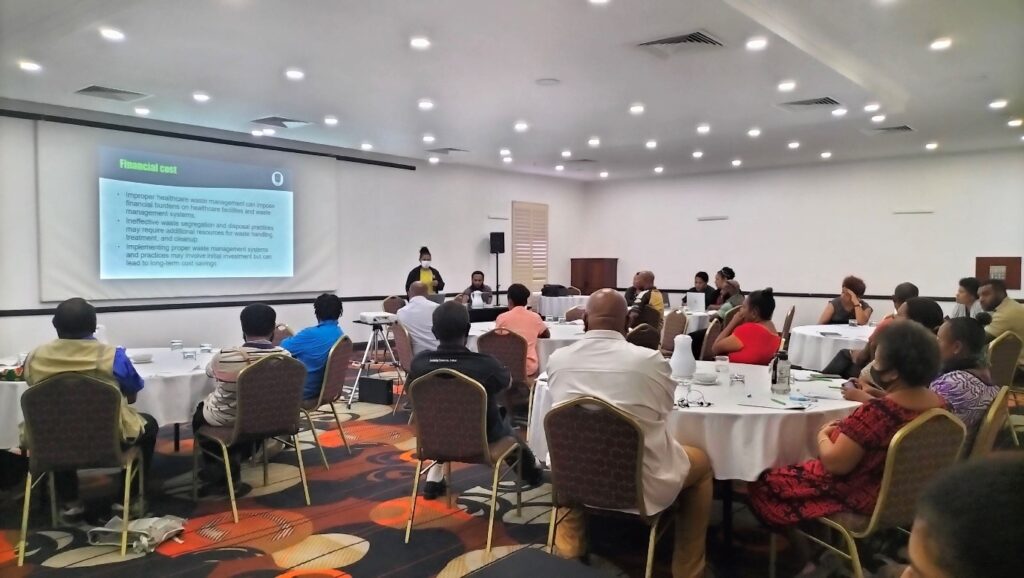
For Ms. Rhonda Tisap, NCDPHA- Health Promotion Programme Coordinator, she said the training was one of the first training on Health Care Waste Management she has attended.
“It was a very important training, and I felt there was an excellent effort put into creating the training manual in both English and Tok Pisin which is a big time way forward in assisting us in conducting our own trainings.”
Ms. Samantha Lomutopa, NCDPHA’s Medical Laboratory Scientist, said the training was a good head start to address poorly handled healthcare waste, which is often ignored.
“I believe most PHA/Health facilities don’t have a system, plan or a policy in place to guide the waste management so the training was a very good head start. It is good to start at our own facility,” she said.
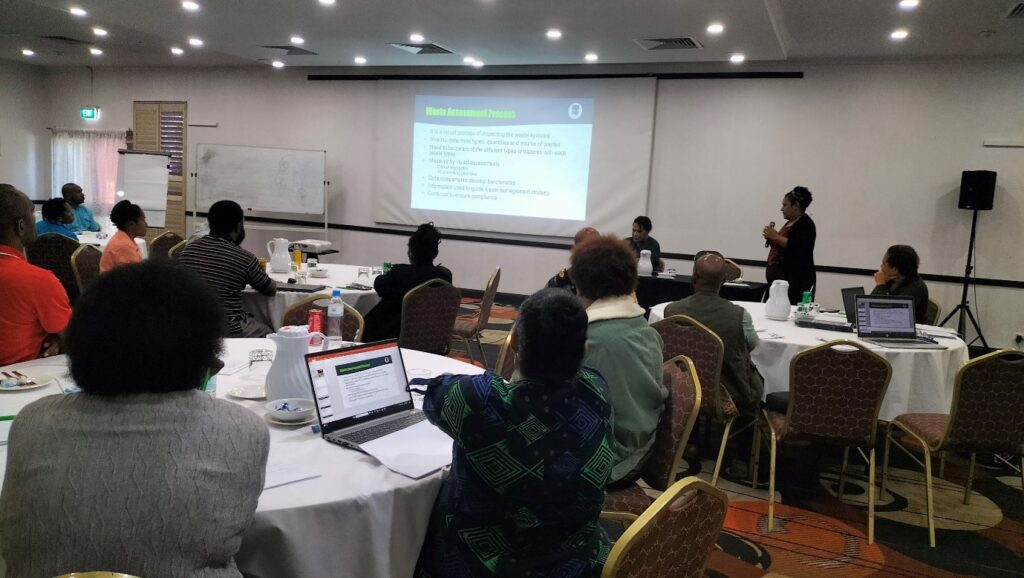
The newly trained trainers actively participated. Various issues related to healthcare waste management in the National Capital District of Port Moresby were discussed with the participants and several valuable insights were shared by participants and the trainers.
All the participants received a Certificate of Participation at the end of the training.
“The evaluation of the training based on how effectively each module was presented by the trainers, and how well each participant’s understanding of the information provided in the modules has been completed, and the course will now be rolled out to hospitals in PNG. The support from PacWastePlus will assist the delivery initially into a further nine hospitals with remaining hospitals to be serviced directly by the trained staff from the initial project support,” said the PacWastePlus Technical Project Officer, Mr. Lance Richman.
28 May 2024, Tarawa – Communities in Kiribati can now count on better management of healthcare waste on the island thanks to the recent commissioning
of an incinerator for the disposal of medical waste at the Ronton Hospital, Kirimati.
The incinerator was secured through the Pacific – European Union (EU) Waste Management Programme, PacWastePlus (PWP). The incinerator and all spare parts were transferred to London Hospital on 7 May 2024.
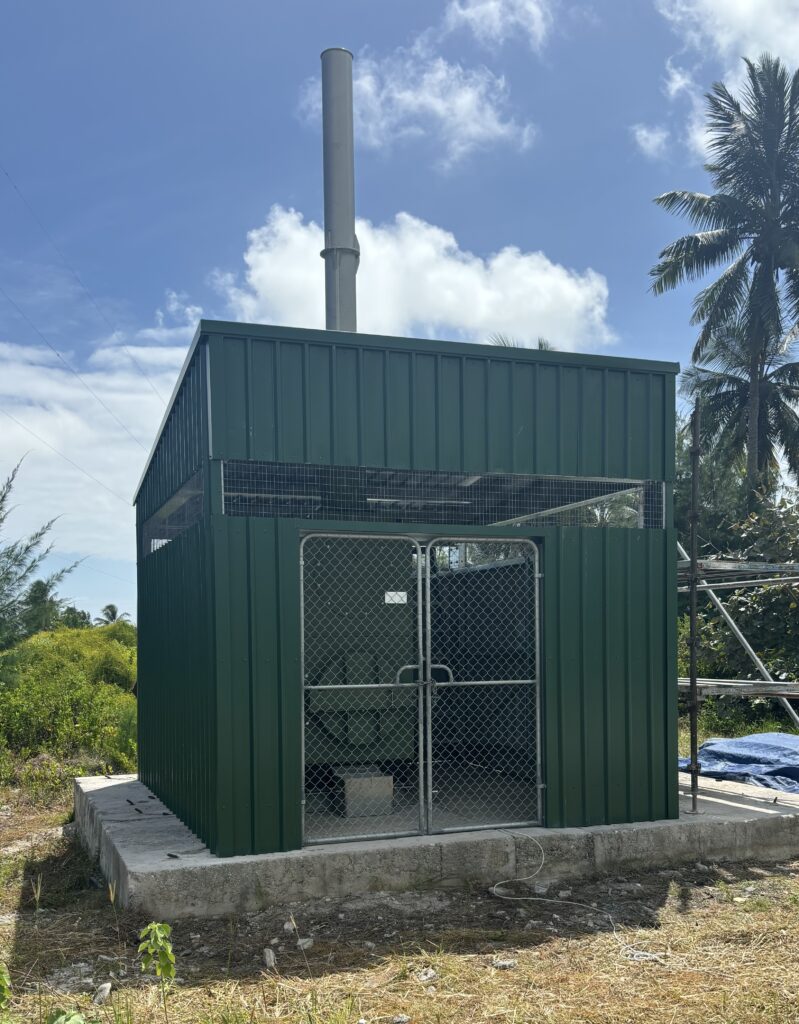
As part of ongoing work, a request from Kiribati was made to PWP to procure, install and commission a high-temperature healthcare waste incinerator suitable for use at the Ronton Hospital.
The project included the supply and installation of the incinerator enclosure, cyclone-rated and designed to protect the incineration plant from the natural environment, to provide a comfortable work environment and a small area for the storage of wastes materials if necessary.
“The hospital in Kiritimati had an incinerator donated by PIMA from the USA. It was out of function for quite so long and as such we had to burn the hospital waste at the waste land far away from the village twice a week,” Dr. Teraira Bangao explained.
“We could not afford to travel twice a week to burn these medical waste. With the new incinerator which is within the hospital compound, we have no more problem travelling far away but just walk and burn these waste. The incinerator is so hot that all the wastes inside become ashes in two hours.”
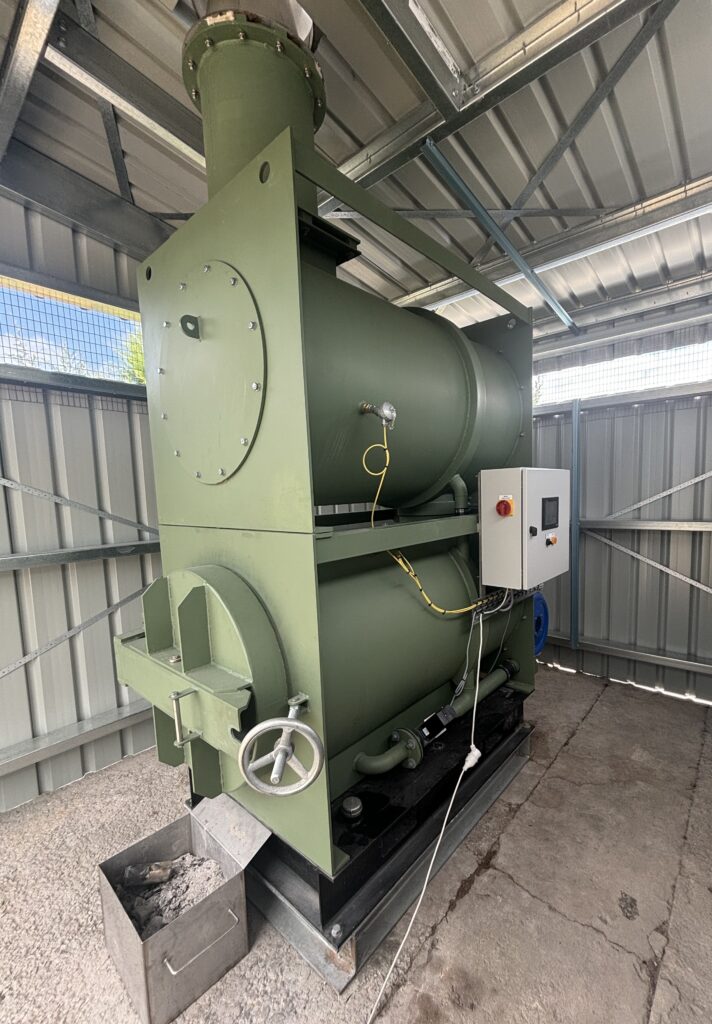
As part of the request, training sessions on the identification and maintenance of all incineration plant components and operation of the incineration plant in an effective and environmentally sound manner was also provided.
Three training sessions addressed the theory and operation of the incineration plant. These sessions were well attended, and the staff present were attentive and responsive.
Two trial burns were performed where it was observed that the incinerator operated efficiently.
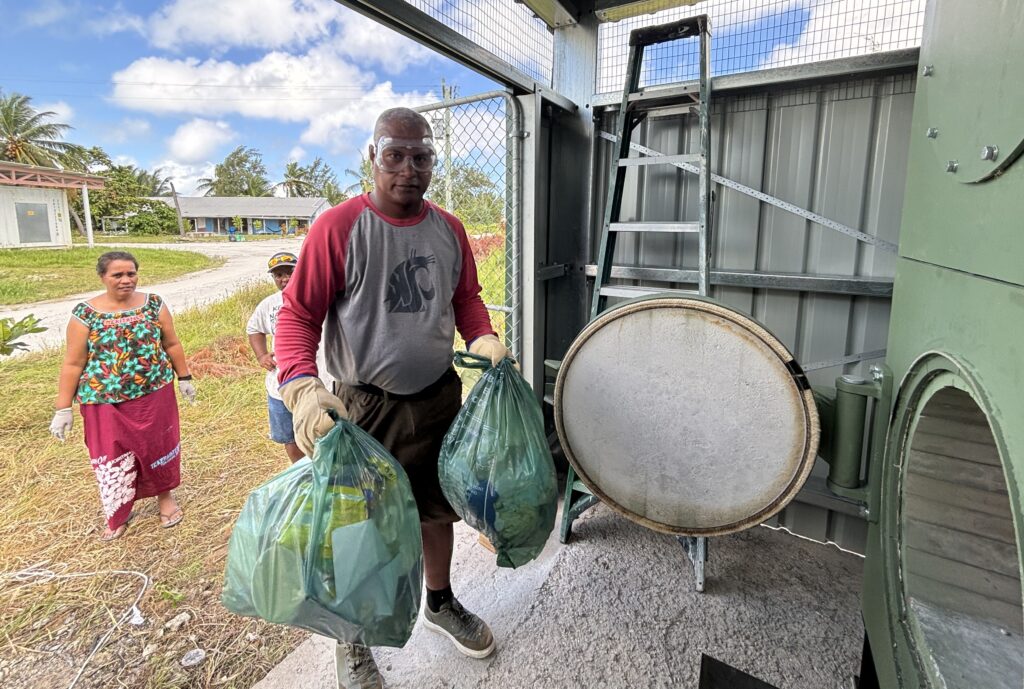
“Thank you for providing us with the good quality incinerator together with a good and strong enclosure with a comfortable space inside for easy movement for staff working in it,” added Dr. Bangao. “We acknowledge the training sessions to our staff who will be responsible for operating the machine. They are now able to operate the machine and to replace broken spare parts so that the machine would continue to operate for years.”
Mr. Lance Richman, PacWastePlus Officer managing the works for SPREP, said the completed installation of the healthcare waste incinerator at London Hospital will now provide a vital service for the hospital and local community ensuring there is reduced chance for release of infection due to inappropriate waste management practices.
The incinerator has joined support work PacWastePlus has implemented throughout the region to protect the health of communities and the environment from hazards related to medical waste. 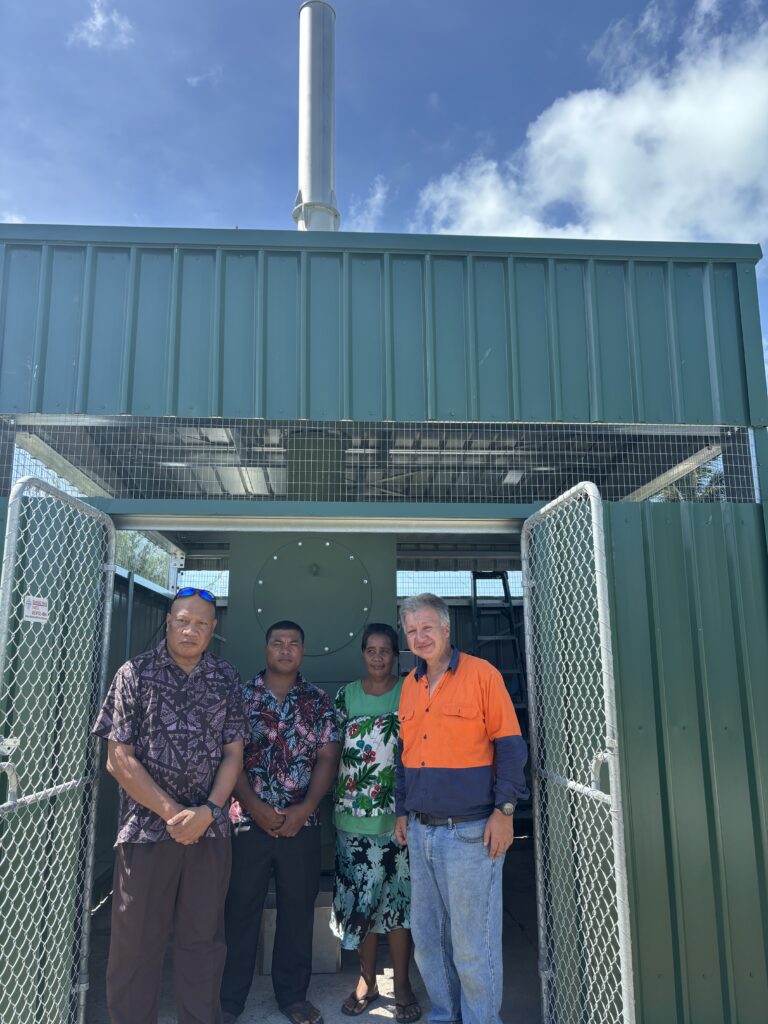

Active youth and women’s groups in the Tuvaruhu community in Honiara are leading community-driven initiatives. These initiatives involve collecting plastic bottles, glass bottles, and discarded materials within the community and nearby river. They upcycle these items from trash into art.

These products, which could have been discarded in landfills or the environment, are transformed into art and craft items. For example, plastic bottles are crafted into flowers, placed on decorated glass bottles, and turned into reusable bags suitable for homes.
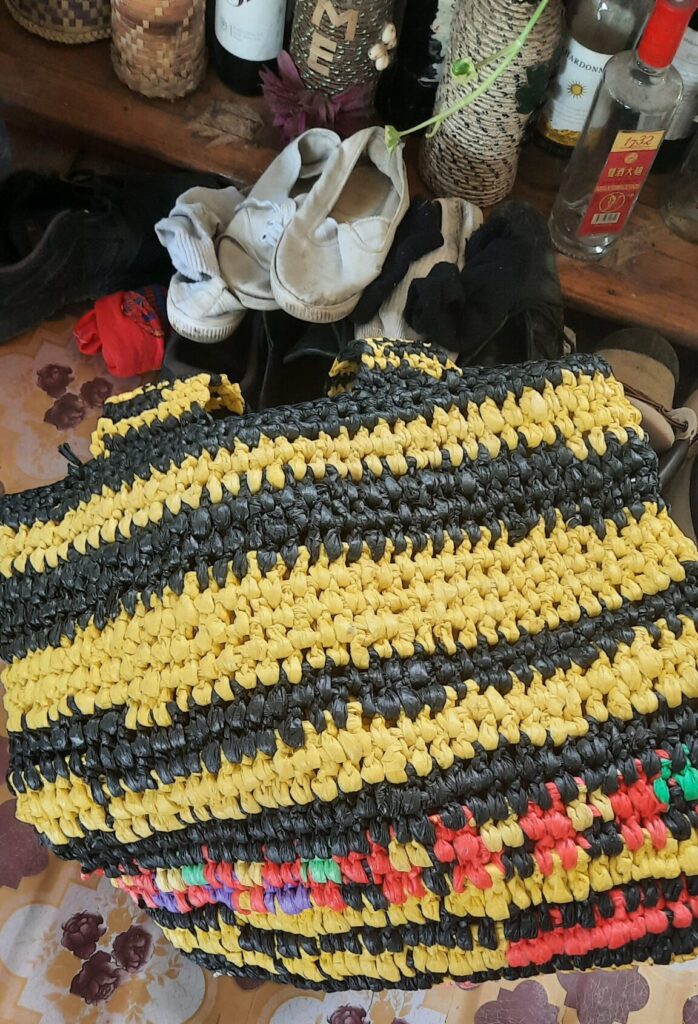
The sale of these crafts, created from plastic and glass bottles, helps community members generate income to meet their families and household needs. The women’s club from the community usually sells their products at market events, in the community, and at national events showcasing community initiatives.

A women’s club has established an award-winning initiative that converts plastic into bricks. This community project aims to tackle the significant plastic waste problem in the Solomon Islands. A total of ten women from the community are part of the Resilience, Innovation, and Social Change Girls Club (RISC), which aims to promote environmental sustainability through innovative projects and social initiatives.
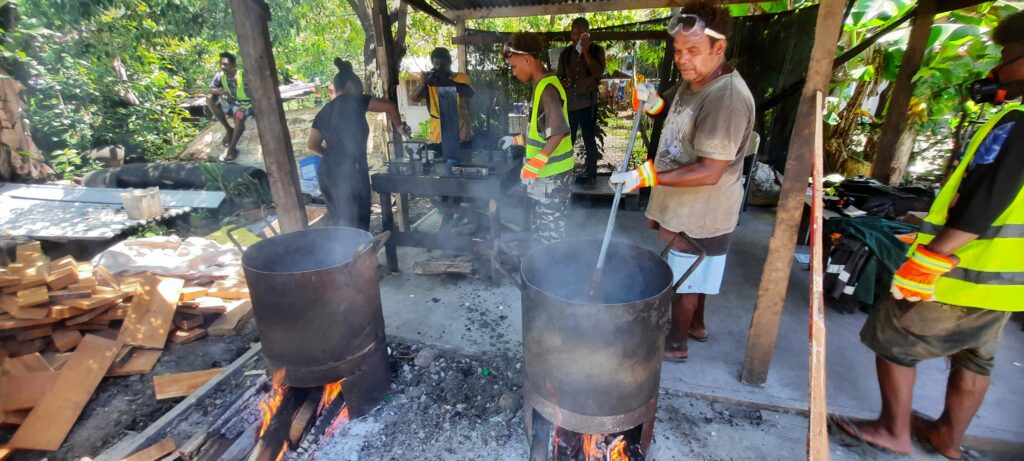
Through months of research, trial, and error, they developed a process to transform discarded plastic into sturdy, eco-friendly bricks that can be used for construction. Their journey serves as an inspiring illustration of proactive environmental entrepreneurship. They have discovered a practical solution to address plastic bottle pollution and transformed it into a sustainable business endeavour.
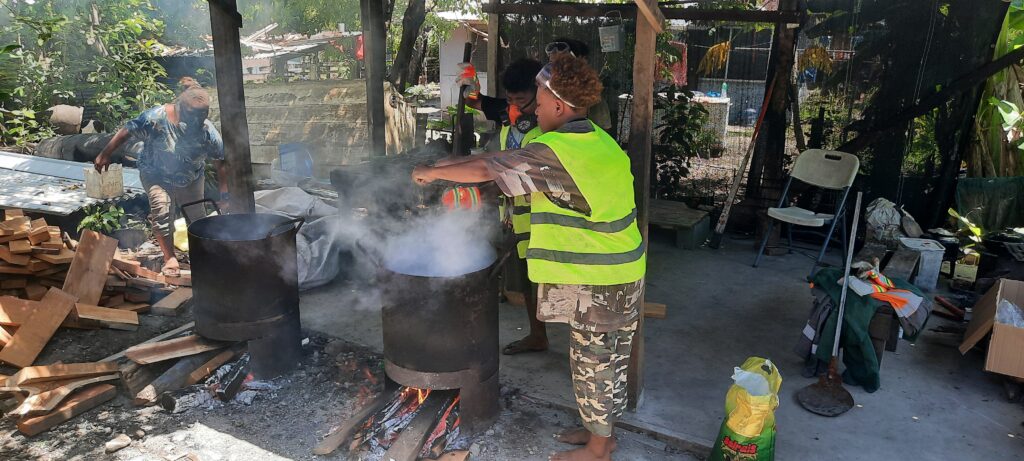
The innovative waste management solution by the RISC Girls Club is the first in the Solomon Islands and the Pacific region to convert plastic into durable bricks. This project aimed to reduce plastic bottle pollution and empower young women to challenge stereotypes and set a positive example.

The group gathers plastic bottles from the community, surrounding areas, rivers, and city locations to transform them into eco-friendly products or for recycling purposes.
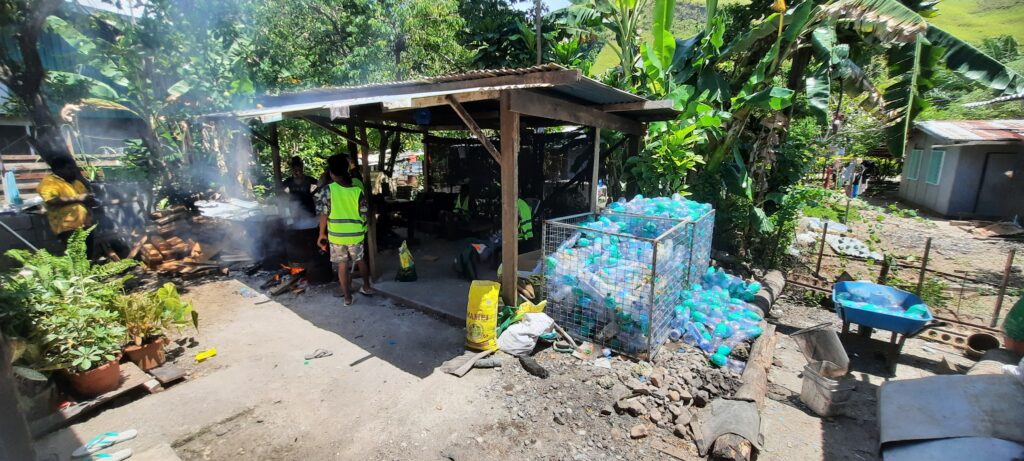
These plastic bottles are combined with black sand from the ocean and transformed into bricks and pavers, providing sustainable construction materials that are sold within the community, at markets, and at events, contributing to waste reduction and environmental conservation.
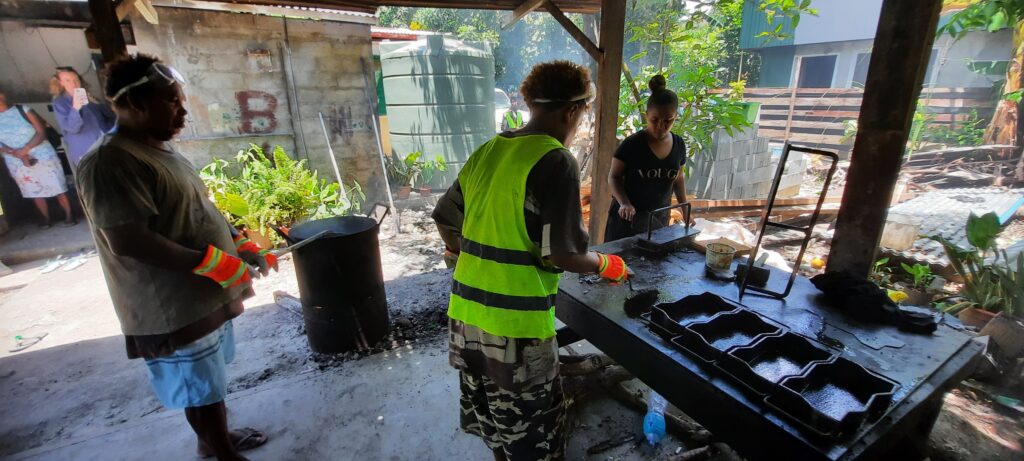
Their story underscores the power of young minds to effect real change and contribute to a sustainable economy. These young entrepreneurs have demonstrated that innovation and resilience drive progress from discarded plastic to durable bricks. Their actions showcase how every small effort contributes significantly to a cleaner, greener future.

The group is exploring opportunities to transition from the community to a dedicated site with proper equipment for enhanced management of health and safety aspects in their community-driven initiative.
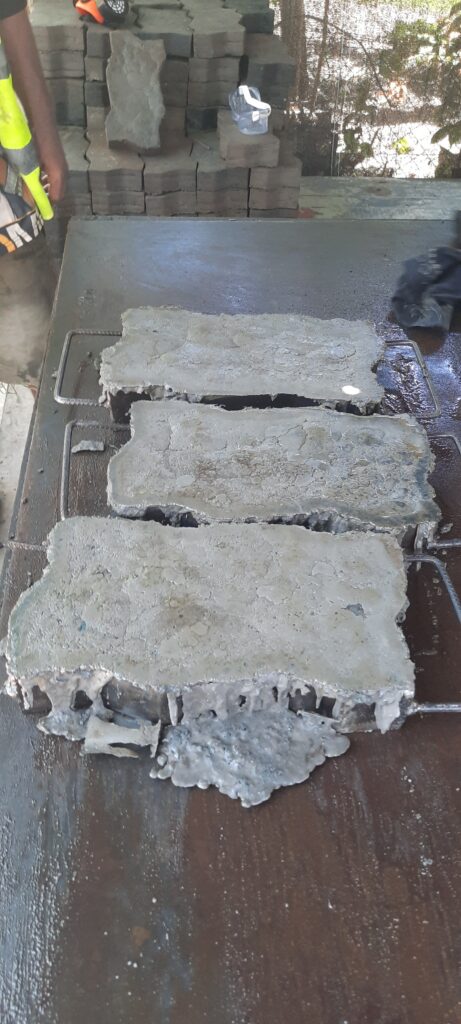

The Tuvaruhu community in Honiara is enthusiastic about initiating a new behaviour change project to engage the community in properly managing recyclables and organic waste generated within the community.”

The pilot project will coordinate with the Honiara City Council (HCC) and the Ministry of Environment, Climate Change, Disaster Management, and Meteorology (MECDMM) to enhance waste collection services for the community.
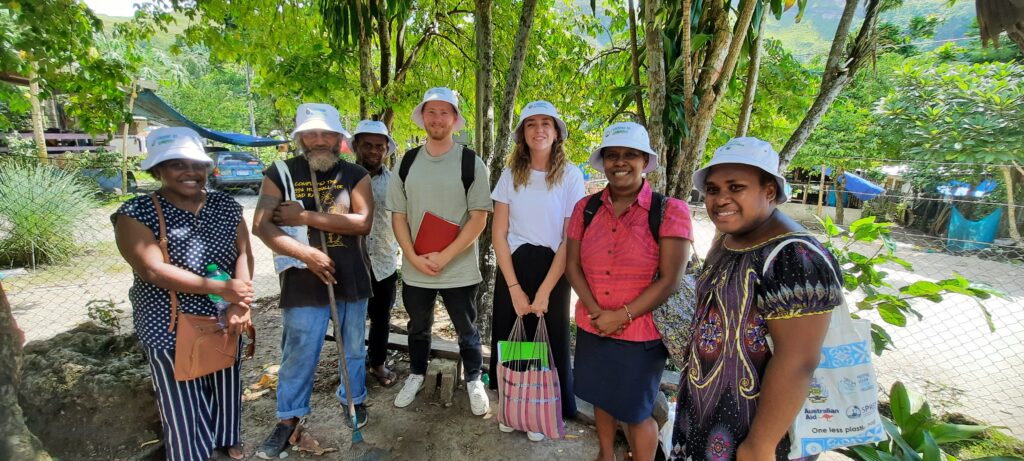
Community leaders and members highlighted that through the implementation of proper waste management practices, they can actively contribute to environmental protection by reducing pollution and conserving natural resources. Due to their commitment to sustainability and conservation, the Tuvaruhu community eagerly anticipates a cleaner and healthier environment for future generations because of their dedicated efforts.
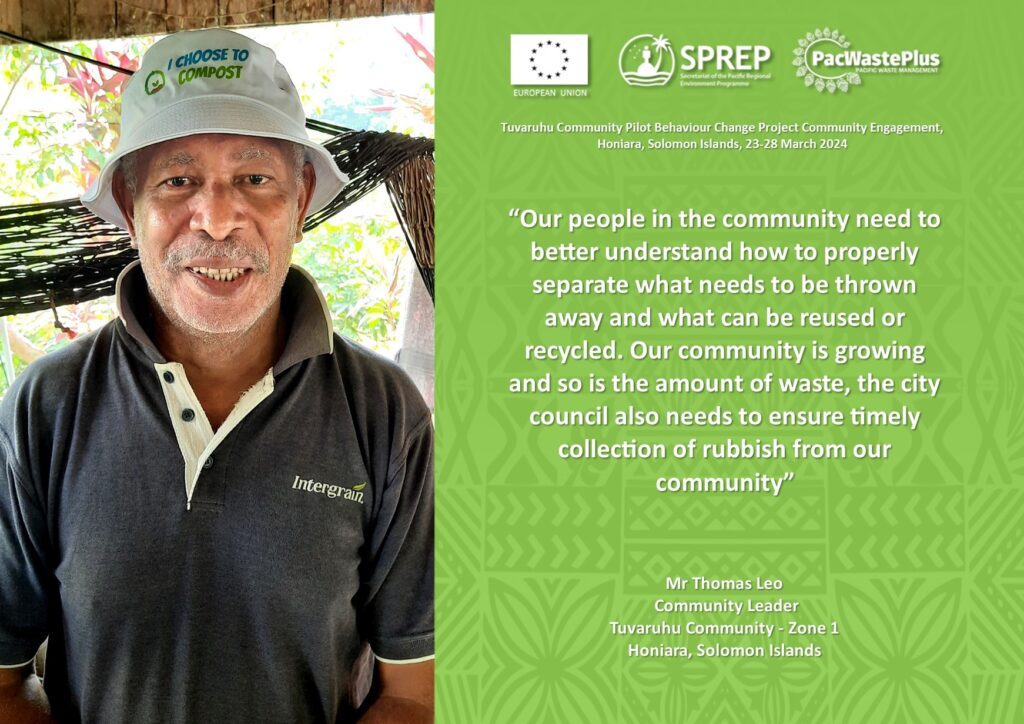
Staff from the European Union-funded PacWastePlus Programme, implemented through SPREP, with consultants from ThinkPlace, conducted a week-long engagement programme. They coordinated with the MECDMM and community leaders to enhance understanding of the proposed pilot project and gain community support for its implementation.
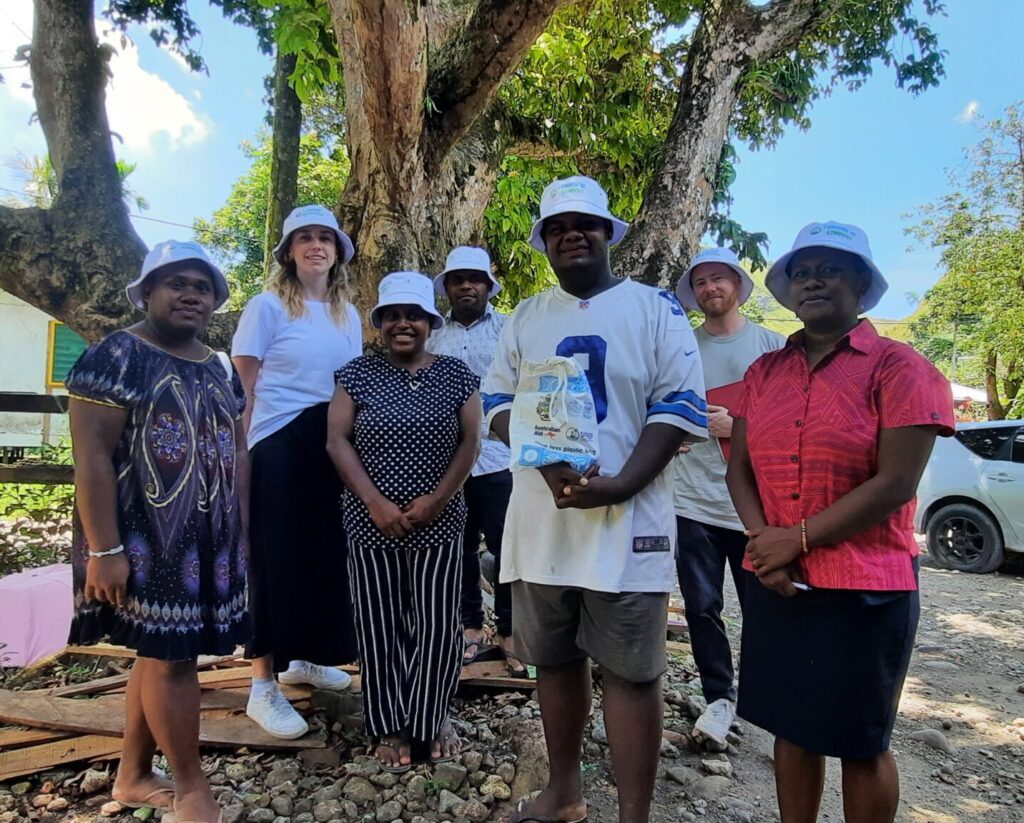
The team held meetings with various stakeholders, including the HCC, to understand the specific challenges faced by the council in providing timely solid waste collection services to the Tuvaruhu community. These discussions aimed to identify solutions to prevent waste from being improperly disposed of in rivers and community areas, where it is often incinerated.

The programme engaged community members in testing different interventions to evaluate their effectiveness, improve delivery methods, and set criteria for measuring impact and potential adoption in the community. The selected intervention for implementation will be evaluated for its long-term effects on the targeted behaviours.
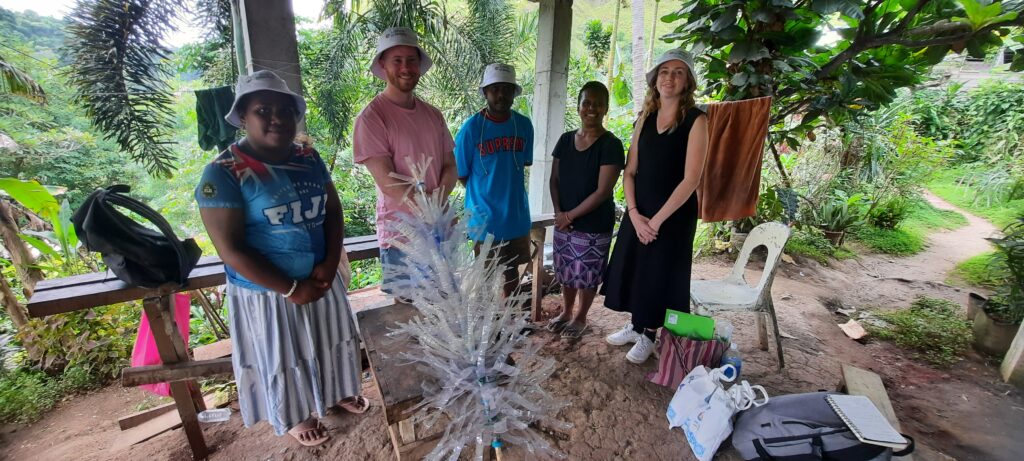
This pilot project aims to reduce waste disposal and dumping in the Tuvaruhu community while promoting proper sorting, recycling, upcycling, and composting to provide community members with opportunities for responsible waste disposal and value creation.
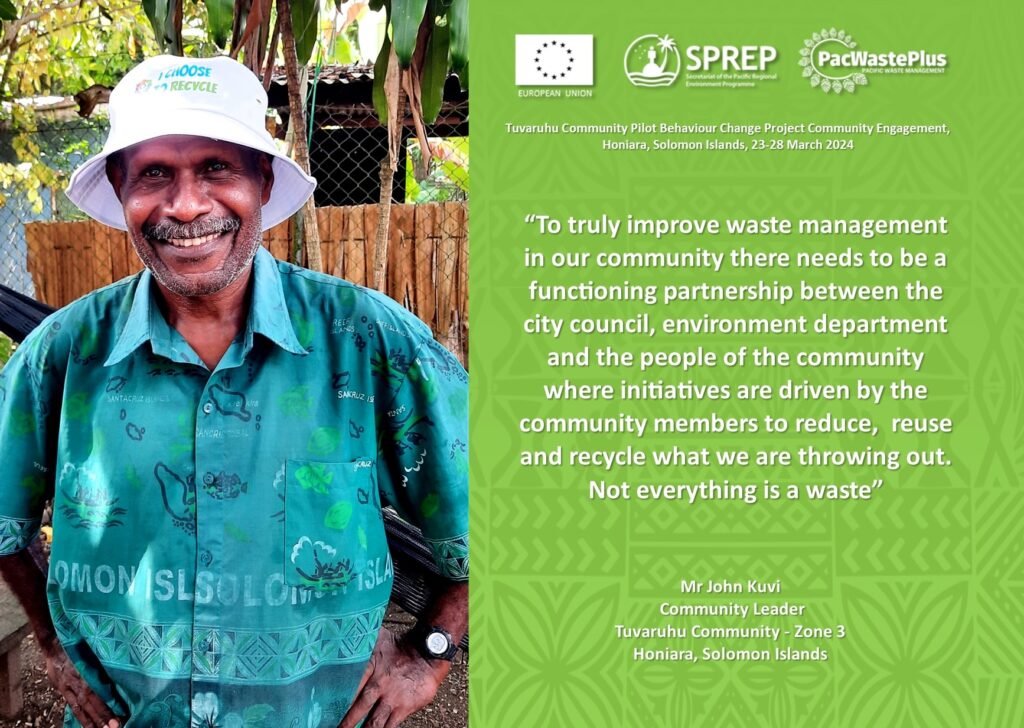
The Solomon Islands community pilot project will join with communities in Vanuatu and Papua New Guinea, where the outcomes of the pilot projects will assist communities and governments throughout the Pacific to replicate the actions and extend the benefits beyond the pilot communities.
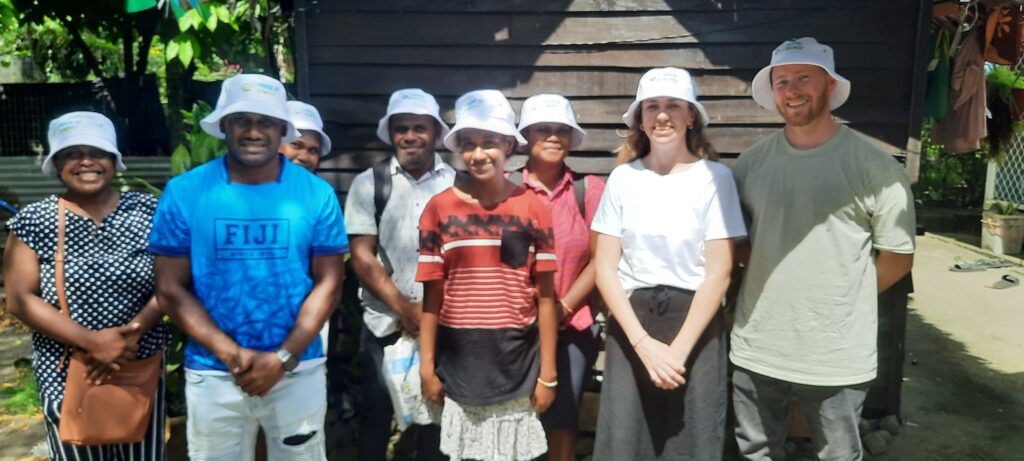
The project will also focus on educating community members about the importance of sustainable waste management practices and the environmental benefits of reducing waste. By empowering individuals to take responsibility for their waste and providing them with the knowledge and resources to do so, the project aims to create a lasting impact on the Tuvaruhu community and inspire similar initiatives in other communities across the Pacific region.

Through collaboration and knowledge sharing, the pilot project seeks to create a network of environmentally conscious communities working towards a cleaner and more sustainable future for the Pacific.
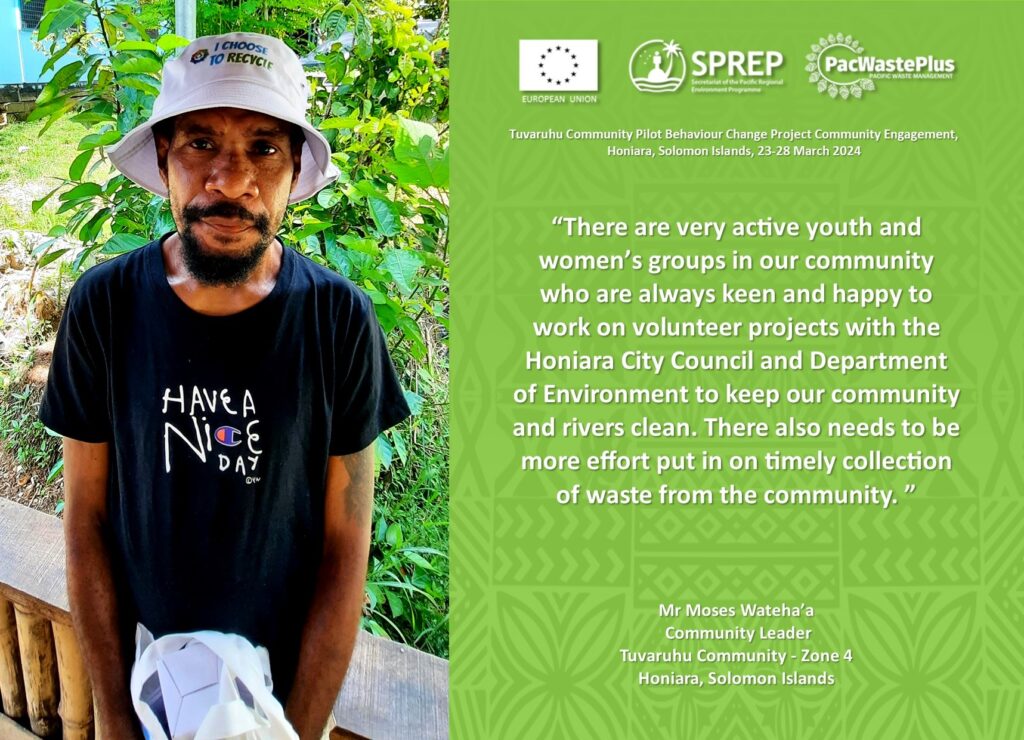
Community Engagement Photo Album
Stockpiles of asbestos-containing materials (ACM) have been safely removed from the Nauru landfill in a recent asbestos abatement activity funded by the European Union-funded PacWastePlus Programme. The cleanup effort involved safely repacking and transporting the hazardous material to a designated disposal facility in New Zealand.
The removal of the ACM has eliminated a potential health hazard for the local community and marks a significant milestone in hazardous waste management in Nauru. Training to the standards set in the Draft Nauru Asbestos Management Code of Practice (equivalent to AUS/NZ standard CPCCDE3014A) was provided to 52 local staff involved in the abatement efforts, along with the provision of personal protective equipment.
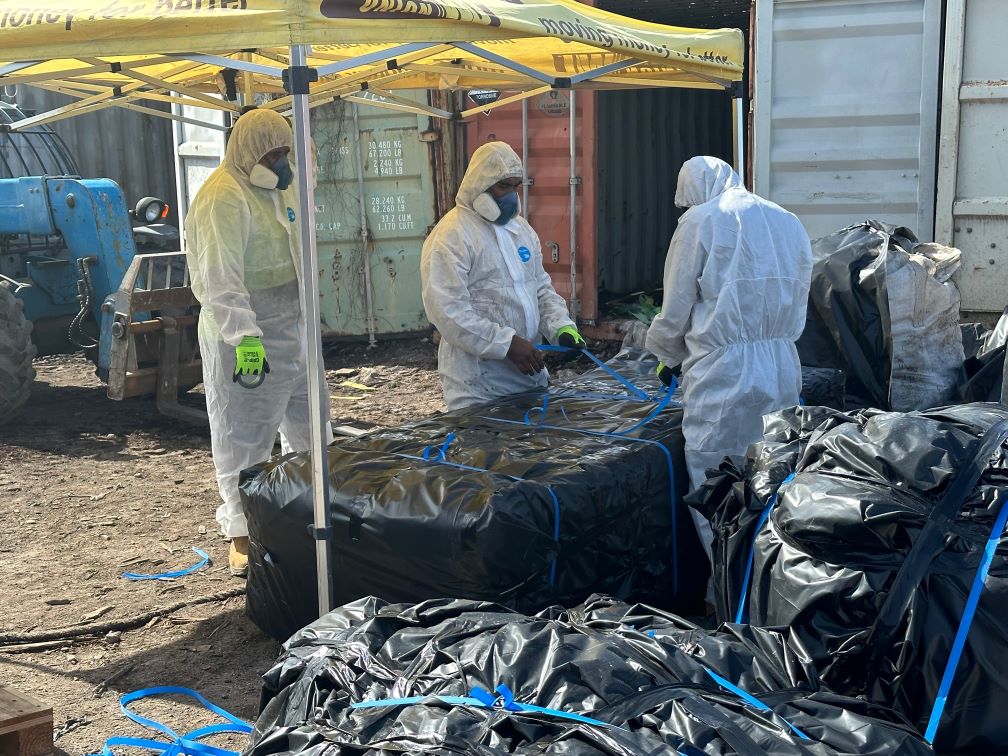
The abatement crew acknowledged the information learned during the workshop as valuable. “I never thought that it could be done that way, and I came to know, and seeing what was done, that people would know about asbestos-containing materials and that they should be taken seriously, but it is also not a product to fear if you wear proper protective equipment and dispose of it properly and do not disturb it”, said Ms. Delvina Thoma, Supervisor, NCR Waste Dumpsite.
“The provision of this abatement training as part of this removal works was important, as new members of the waste unit need to be trained on how to do the abatement work, as well as learn how to monitor and manage this issue, as our people need to be educated on how to safely manage ACM. We hope PacWastePlus can offer similar training opportunities in future” said Mr Bryan Starr, Director of Environment.
“I would like to see the Draft Asbestos Code of Practice work taken up under the Act, so that any future ACM abatement work will follow that code, and ensure proper monitoring occurs as well.”
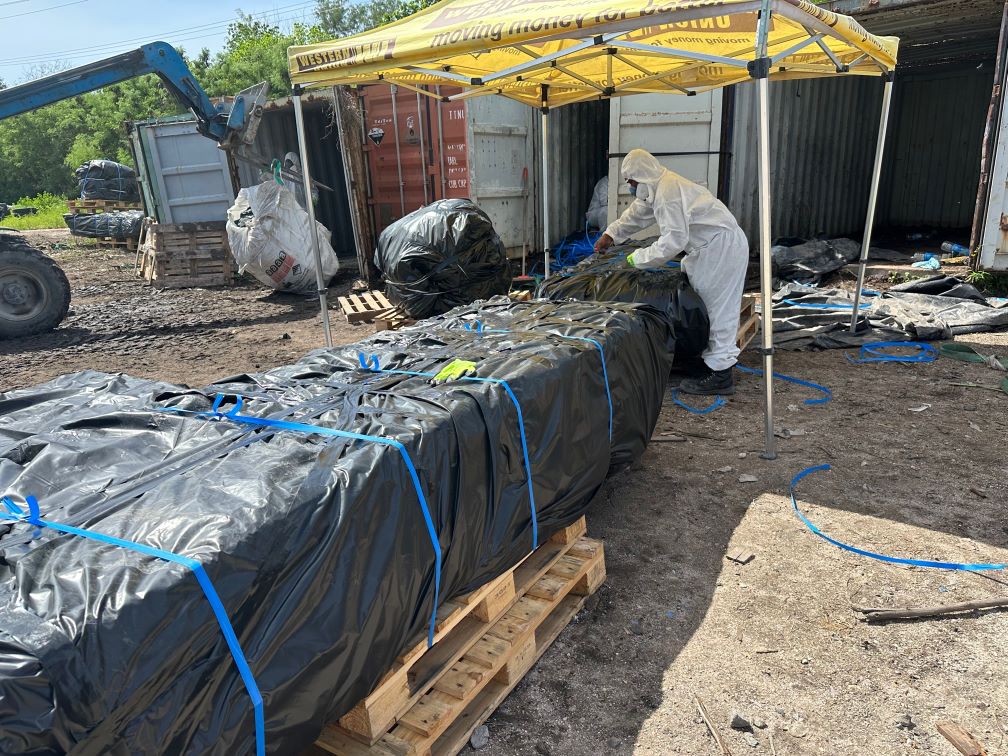
The deteriorating containers housing the ACM were opened, and the stored ACM waste was removed and double-wrapped, put on certified pallets, double-wrapped again with 200-micron plastic, and secured to the pallets using a nylon strapping machine.
The material was then transferred into new seaworthy containers and sealed. The old containers were vacuumed clean, wet wiped, and closed to ensure no ACM waste remained. Continuous air monitoring and sampling were conducted throughout the project to safeguard the safety of workers and others near the site.
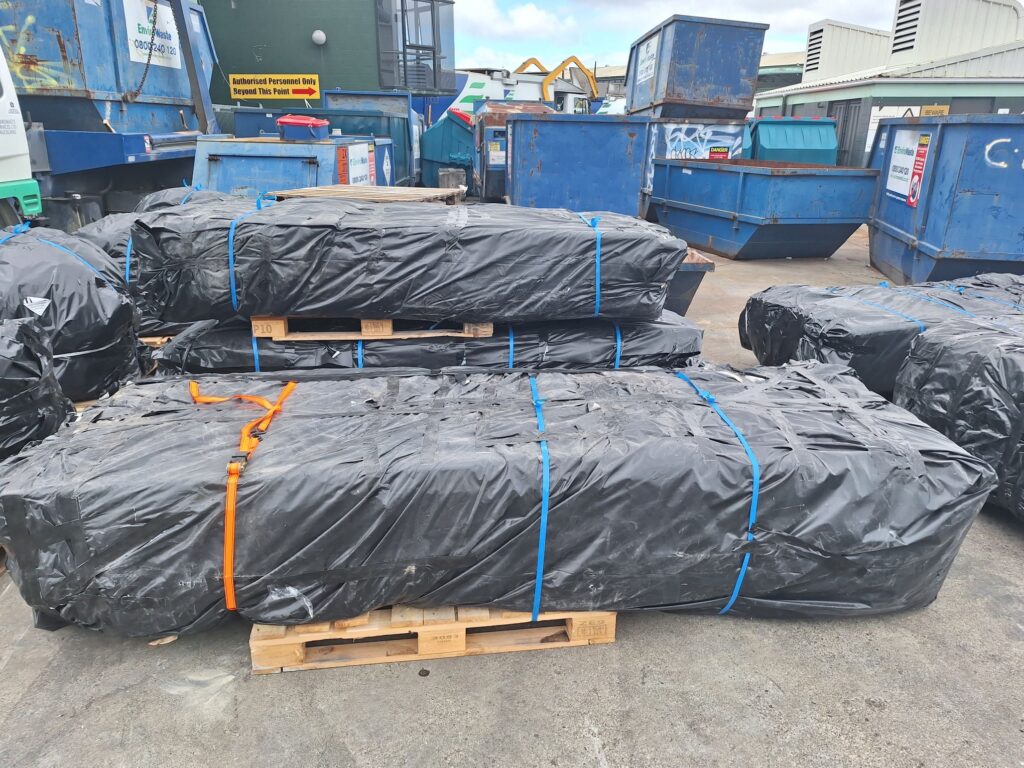
The SPREP implemented and EU-funded PacWaste Plus programme at the request of the Ministry of Health in Timor Leste, developed and delivered Healthcare Waste Management Training for hospital staff throughout the country.
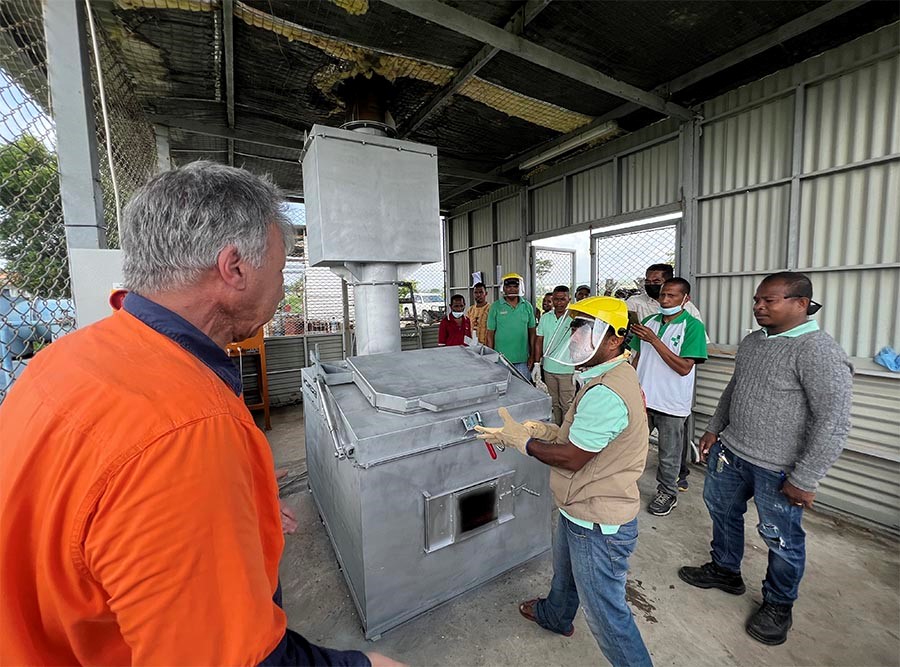
The training was designed for those who are responsible for implementing both the waste management strategy and conducting the education program. The day-long training covered seven modules and provided holistic training on issues of waste management from healthcare facilities.
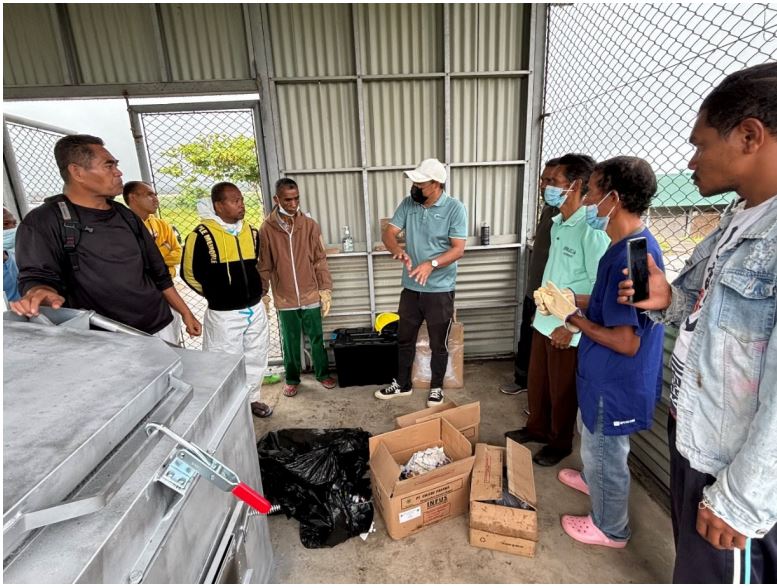
Sixteen Ministry staff graduated from the training and are now able to conduct future training sessions for hospital personnel as required.
With PacWaste Plus support, the Ministry trainees delivered the course to over 150 staff at the Guido Valadares National Hospital, Maliana Referral Hospital, Suai Referral Hospital, and Maubisse Referral Hospitals.
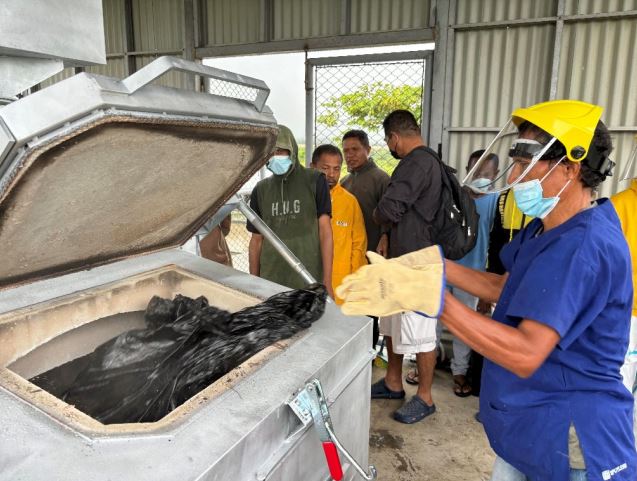
The training participants expressed appreciation for the delivery of the training of trainers structured course which would enable them to share knowledge and learnings across the referral hospitals once the trained officers return to their respective areas of operation.
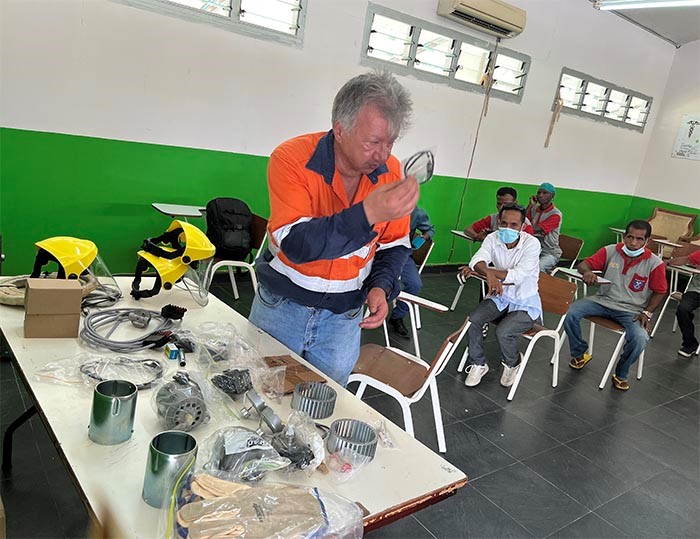
“This training was valuable as we learned of important aspects of healthcare waste like the need for proper management and safe disposal of medical waste generated in our hospitals,” said a participant of the training.
“We now feel empowered to share this knowledge gained on improving safe disposal of our medical waste with our colleagues back in the referral hospitals so they can put into practice what we have learned,” said another training participant.
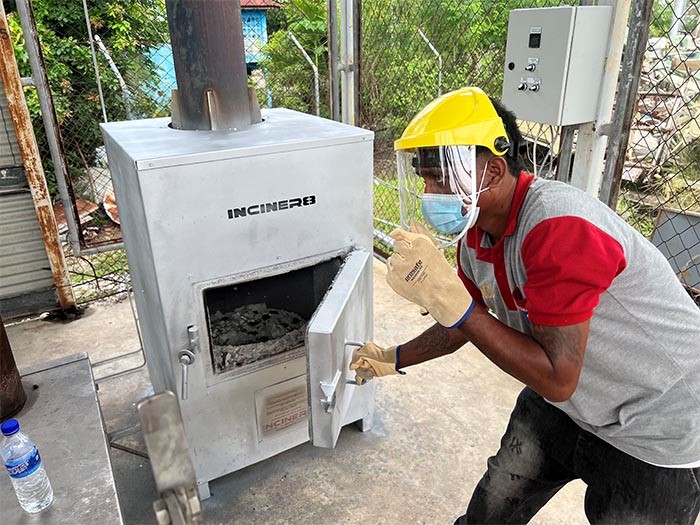
The programme will continue to work with MoH to help improve healthcare waste management in Timor Leste and assist in capacity development opportunities.
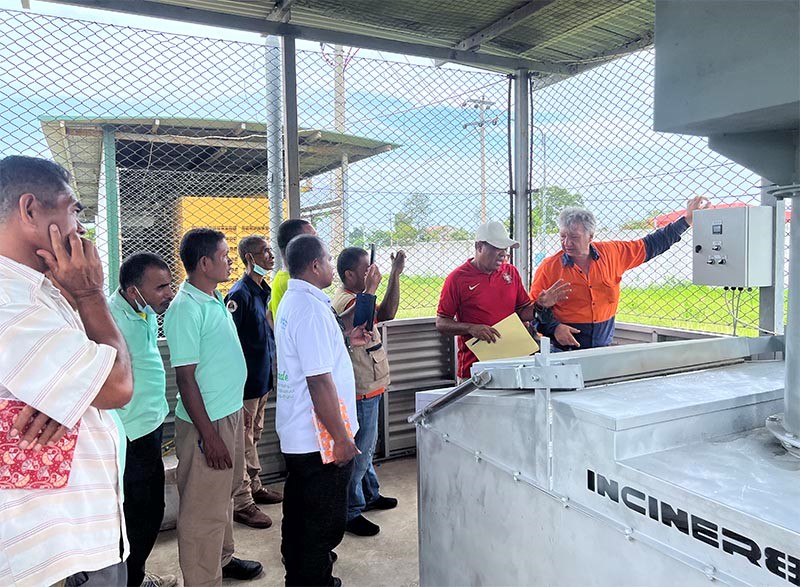
The PacWastePlus programme, in collaboration with the National Directorate for the Environment and the Ministry of Health (MoH) in Timor Leste, is improving long-term healthcare waste management through the construction of specialised facilities and the development of sustainable waste management practices in hospitals.
Baucau Hospital has recently been the focus of works, with the construction of three disposal facilities which are a pit for disposal of legacy partially burned medical waste located on hospital grounds, a specialised disposal pit to accept sharps waste, i.e., scalpels, needles, vials, etc., and an anatomical pit for disposal of biological waste.
Before the construction of this facility, waste was either burned in open fields adjacent to the hospital wards or collected by local waste contractors for disposal.
During a handing over ceremony of the improved healthcare waste disposal facilities, held in late December 2023, the Vice Minister of Health, Hon. Jose dos Reis Magno expressed gratitude to the European Union and SPREP for the upgrade works carried out to improve medical waste facilities in Hospital.
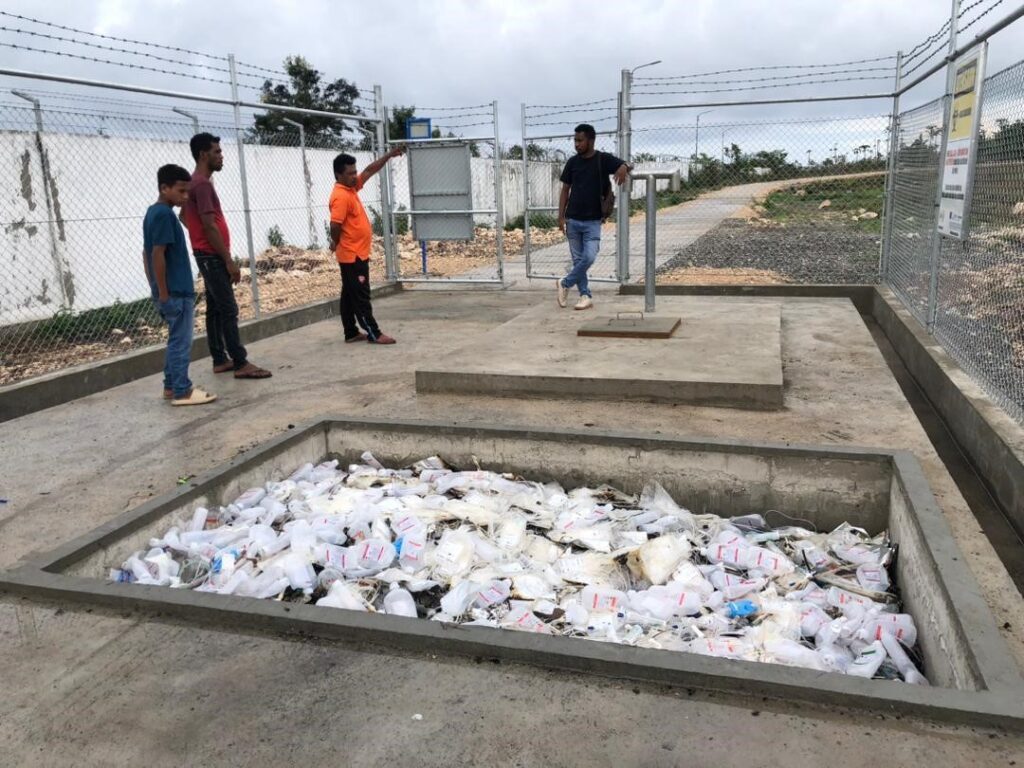
“We appreciate the continued efforts of SPREP which will support repairs to the hospital Incinerators to burn the medical hazardous waste and proper disposal facilities for managing medical waste to help reduce the health issues and request for to continue support the same facilities of the Medical Waste into other Referral Hospitals,” said Hon. Jose dos Reis Magno during the event.
The PacWastePlus programme will continue to provide technical support to Timor-Leste to enhance the management of healthcare waste in hospitals and referral healthcare centres.

